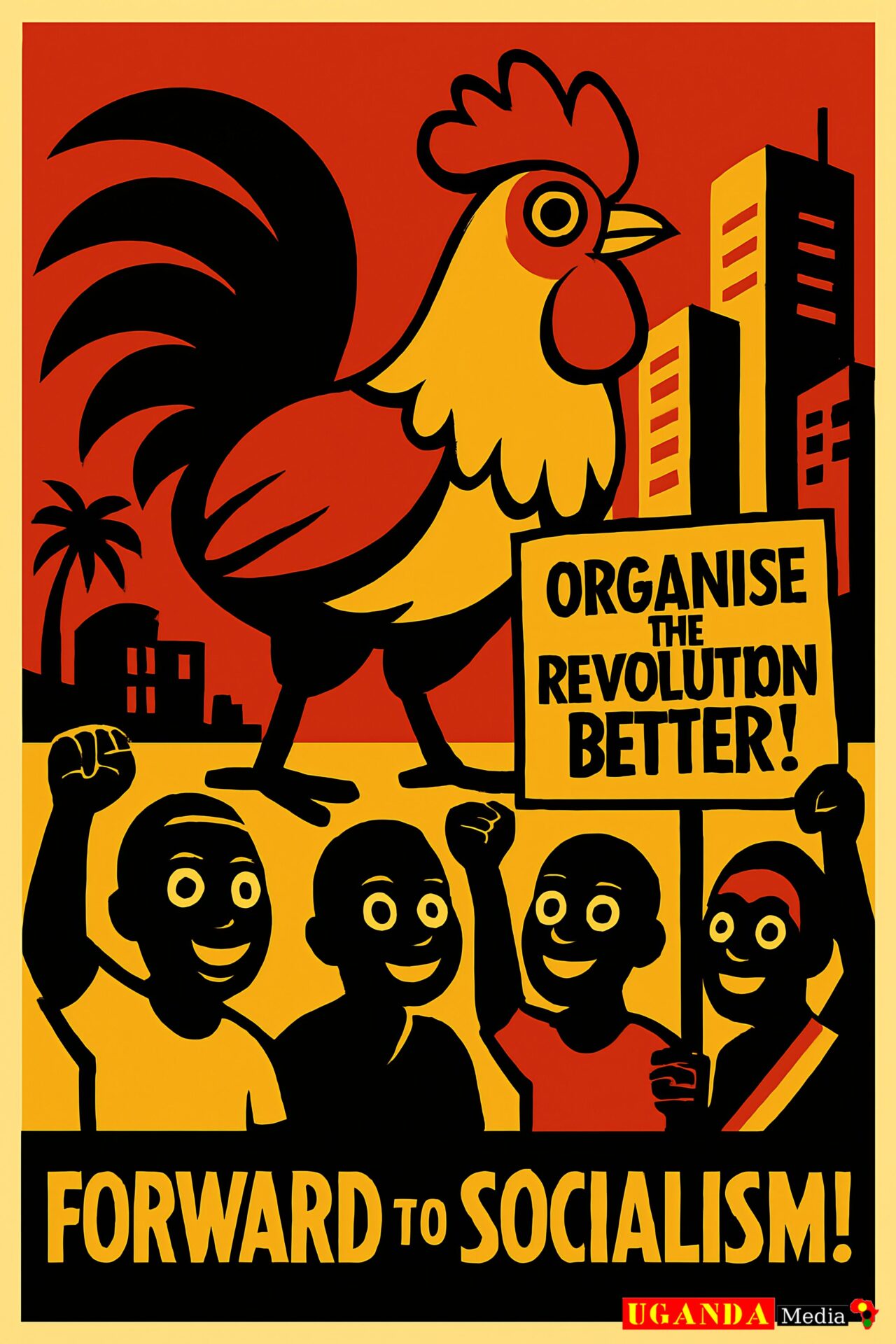Navigating Governance Challenges and Democratic Accountability in Uganda’s Parliament
On 17 April 2025, the Eleventh Parliament of Uganda convened to address pressing national issues, ranging from delayed salaries for police officers to systemic inefficiencies in public service delivery. The session underscored the delicate balance between development aspirations and procedural integrity, as legislators grappled with unresolved grievances related to financial reallocations, civilian trials in military courts, and environmental conservation mandates. Prominent voices such as Hon. Joel Ssenyonyi, Leader of the Opposition, and Hon. Sarah Opendi highlighted gaps in implementation, calling for transparency and accountability across governance frameworks.

From scrutinising the Rationalisation of Government Agencies and Public Expenditures (RAPEX) Reform to debating the degazettement of forest reserves like Gulu Central Forest Reserve, parliamentarians demonstrated their commitment to aligning policy intent with tangible outcomes. However, persistent challenges—such as discrepancies in uploaded schedules, delays in judicial reforms, and systemic payroll issues—revealed the distance between legislative promises and real-world impact.
This comprehensive analysis delves into the key debates, procedural concerns, and alternative perspectives discussed during the sitting, offering insights into how Uganda’s democratic institutions are navigating complex socio-economic and environmental challenges. By examining these issues through the lens of transparency, accountability, and participatory governance, this article serves as a blueprint for understanding the nation’s path toward sustainable development and equitable progress.
The Role of Parliament in Democracy: A Beacon of Accountability in Uganda
In the vibrant tapestry of Ugandan governance, the role of Parliament stands as a cornerstone of democracy—a principle often encapsulated by the adage, “A house divided against itself cannot stand.” This wisdom underscores the necessity for unity and accountability within institutions that serve the people. In this context, parliamentary sittings emerge not merely as routine gatherings but as vital platforms where societal concerns are aired, debated, and addressed with transparency and rigour.
On Thursday, 17 April 2025, the Parliament of Uganda convened at its iconic Kampala chambers to deliberate on issues ranging from budget reallocations to judicial reforms. These discussions were far from abstract exercises; they represented the collective voice of citizens echoing through their elected representatives. As debates unfolded under the watchful gaze of history, it became evident that Parliament serves two critical functions: championing the interests of society while ensuring governmental actions align with constitutional mandates.
Addressing Societal Concerns
Parliamentary sittings provide an indispensable forum for addressing pressing national challenges. For instance, during the session, legislators grappled with matters such as delayed salaries among police officers, unresolved civilian trials held in military courts, and environmental conservation efforts. Each issue reflected broader societal frustrations—be it unpaid wages leaving rural officers struggling or deforestation threats jeopardising Uganda’s ecological future. By bringing these concerns into the public domain, Parliament ensures no grievance remains unspoken nor any injustice unseen.
This commitment to representation resonates deeply in Uganda’s diverse setting, where communities face unique struggles shaped by geography, culture, and socio-economic conditions. When Hon. Sarah Opendi raised the plight of unpaid policemen in Tororo District, she spoke not only for her constituents but also for countless others who rely on law enforcement for security and stability. Similarly, when lawmakers questioned delays in transferring civilian cases to appropriate courts, they highlighted how procedural lapses can undermine trust in justice systems. Such dialogues remind us that Parliament is more than a legislative body—it is a mirror reflecting society’s hopes, fears, and aspirations.
Holding Government Accountable
Beyond representation, Parliament plays a pivotal role in holding government accountable—a duty akin to keeping firewood dry before lighting a flame. Without oversight, even well-intentioned policies risk mismanagement or corruption. During the sitting, several instances illustrated this function vividly. For example, Hon. Denis Oguzu scrutinised discrepancies between uploaded schedules and those presented during the debate on budget reallocation. His insistence on clarity demonstrated Parliament’s responsibility to ensure every shilling allocated aligns with approved work plans.
Moreover, questions directed at ministers revealed persistent gaps in execution. When Leader of the Opposition Joel Ssenyonyi pressed for updates on civilian trial transfers, he underscored Parliament’s duty to demand action over empty promises. Likewise, Attorney-General Kiryowa Kiwanuka faced scrutiny over delays in resolving legal ambiguities affecting police lawyers’ salaries. These exchanges reinforced the idea that accountability thrives on persistence—a lesson aptly summarised by another Ugandan proverb: “Patience digs up a well.”
Balancing Unity and Division
While Parliament strives to unite voices around common goals, it must navigate inherent divisions stemming from political affiliations, regional interests, and ideological differences. However, these tensions need not weaken the institution if channelled constructively. Take, for instance, bipartisan support expressed during discussions on forest reserves like Gulu University’s contentious land use. Despite initial disagreements, consensus emerged on adhering strictly to legal procedures—a testament to Parliament’s capacity to reconcile conflicting perspectives.
Indeed, the strength of Parliament lies not in uniformity but in its ability to foster dialogue amidst diversity. Just as rivers carve paths through rugged terrain, so too does robust debate shape inclusive policies benefiting all Ugandans. Whether debating financial prudence or human rights enforcement, each exchange reinforces the shared commitment to building a fairer, more prosperous nation.
Lighting the Way Forward
The proceedings of 17 April 2025 exemplified why parliamentary sittings remain indispensable pillars of democracy. They offer spaces where grievances find expression, solutions take root, and governments remain answerable to those they serve. Yet, fulfilling this mandate requires vigilance, courage, and unwavering dedication—an ethos embodied by the African saying: “If you close your eyes to facts, you will learn through accidents.”
As Uganda continues navigating complex socio-political landscapes, its Parliament must uphold its dual role as both advocate and auditor. Only then can it truly embody the spirit of democracy, ensuring that governance reflects not just the will of leaders but the aspirations of ordinary citizens striving for better tomorrows.
Contextualising the Date: A Day Etched in History
“A stitch in time saves nine.” This timeless adage, which underscores the importance of timely action to prevent greater problems later, resonates profoundly when examining the significance of 17 April 2025 in Uganda’s parliamentary calendar. It was on this day that the Parliament of Uganda convened for its 29th sitting during the Fourth Session—a date that would come to symbolise both accountability and resolve amid mounting public scrutiny over unresolved national issues.
The Culmination of Critical Policy Decisions
Thursday, 17 April 2025, was not merely another routine session; it marked a pivotal juncture where several long-delayed policy decisions reached their tipping point. From budget reallocations under Rationalisation of Government Agencies and Public Expenditures (RAPEX) Reform to judicial reforms addressing civilian trials held in military courts, the proceedings reflected an urgent need to address systemic inefficiencies before they spiralled into crises.
For instance, Minister Henry Musasizi’s request to transfer Shs 13.33 billion across various ministries highlighted efforts to streamline service delivery by reallocating resources from defunct entities to functional ones. Yet, as debates unfolded, concerns about transparency emerged, with Hon. Denis Oguzu questioning discrepancies between uploaded schedules and those presented in the House. Such exchanges demonstrated how public trust hinges on meticulous attention to detail—a lesson reminiscent of the proverbial “stitch” needed to mend governance gaps proactively.
Growing Public Scrutiny
The session took place against a backdrop of growing dissatisfaction among Ugandans who had grown weary of unfulfilled promises and bureaucratic inertia. Delays in implementing the Supreme Court ruling on transferring civilian cases from military courts exemplified this frustration. Attorney-General Norbert Mao assured Members of Parliament that the UPDF (Amendment) Bill, 2024, aimed to address constitutional concerns but offered little clarity on immediate actions. Opposition members like Joel Ssenyonyi countered these assurances, demanding concrete timelines instead of vague updates. Their insistence echoed society’s yearning for tangible progress—a sentiment increasingly amplified through media platforms and grassroots activism.
Moreover, grievances surrounding delayed salaries for police officers added fuel to the fire. When Hon. Sarah Opendi raised the plight of unpaid policemen and women, she spoke not only for her constituents in Tororo District but also for countless others grappling with similar challenges nationwide. Her remarks underscored how systemic failures affect real lives—whether it be teachers unable to access loans due to erratic payrolls or rural officers lacking internet connectivity to resolve payroll disputes. These anecdotes painted a vivid picture of administrative lapses cascading into societal discontent.
Marking the Moment Amid Challenges
In many ways, 17 April 2025 epitomised the delicate balance between aspiration and execution within Uganda’s democratic framework. On one hand, Parliament showcased its commitment to tackling complex issues head-on. On the other, persistent delays and procedural ambiguities revealed underlying weaknesses requiring urgent redress. As legislators deliberated on matters ranging from environmental conservation to energy sector accountability, each decision carried profound implications for the nation’s future trajectory.
This convergence of critical policy decisions amidst heightened public vigilance made the date particularly significant. Like threads woven into a tapestry, every debate, motion, and resolution contributed to shaping Uganda’s socio-political landscape. And while some knots remained untied, the very act of confronting them head-on signified hope—that timely interventions could indeed save the fabric of governance from unravelling further.
By contextualising 17 April 2025 through the lens of “a stitch in time saves nine,” we see how proactive measures can mitigate larger risks down the line. Whether addressing financial prudence, human rights enforcement, or ecological preservation, the session embodied both the promise and pitfalls of democratic governance. For Ugandans watching closely, it served as a reminder that meaningful change demands vigilance, persistence, and collective effort—an ethos encapsulated beautifully in this age-old wisdom.
Budget Reallocation and Financial Management
Reallocation of Budget Estimates: A Stitch in Time Saves Nine
“A stitch in time saves nine.” This adage, which underscores the importance of addressing issues promptly to prevent larger problems later, encapsulates the essence of the motion authorising the reallocation of funds under the Rationalisation of Government Agencies and Public Expenditures (RAPEX) Reform. During the parliamentary sitting on Thursday, 17 April 2025, this discussion took centre stage as lawmakers grappled with ensuring seamless service delivery amid institutional restructuring—a task that demanded both precision and accountability.
The Context of RAPEX Reform
The RAPEX initiative was conceived as a strategic effort to streamline government operations by merging or dissolving redundant entities, thereby reducing inefficiencies and optimising resource allocation. On this particular day, the Minister of Finance, Planning and Economic Development, Mr Henry Musasizi, sought Parliament’s approval to reallocate Shs 13.33 billion from rationalised institutions to their new host ministries. These transfers were designed to ensure continuity in functions such as regulatory oversight, vocational training, and technical examinations—services previously managed by now-defunct agencies like the Uganda Microfinance Regulatory Authority (UMRA), the Uganda Business and Technical Examinations Board (UBTEB), and others.
However, as debates unfolded, it became clear that while the intent behind RAPEX was noble, its execution required meticulous attention to detail—a lesson embodied in the proverbial “stitch.” Without clarity and transparency, even well-meaning reforms risk unravelling into confusion and public distrust.
Addressing Concerns Over Transparency
One of the primary concerns raised during the session revolved around discrepancies between uploaded schedules and those presented in the House. Hon. Denis Oguzu, representing Maracha County, pointed out that the provided documents lacked precision regarding the source and destination of funds. He questioned how Parliament could approve allocations without explicit details on where each shilling originated and where it would be directed. His remarks echoed broader societal frustrations over opaque financial processes—a sentiment amplified when Hon. Allan Mayanja noted differences between uploaded documents and those read aloud by the minister.
This lack of alignment highlighted a critical gap in communication and documentation. As the adage suggests, failing to address these ambiguities early could lead to greater complications down the line. For instance, if funds earmarked for specific functions failed to reach their intended recipients due to procedural lapses, essential services might suffer, undermining public confidence in governance.
Ensuring Accountability Through Work Plans
Another key issue centred on work plans—detailed blueprints outlining how allocated resources would be utilised. When Hon. Lee pressed the minister to clarify whether work plans accompanied the proposed reallocations, he touched upon a fundamental principle of fiscal responsibility: money must align with purpose. Without accompanying work plans, there is no guarantee that funds will serve their intended objectives—an oversight akin to sewing fabric without securing the thread properly.
Minister Musasizi assured members that all transfers adhered strictly to budgets already approved by Parliament, emphasising that no new funds were being drawn from the Consolidated Fund. Yet, his assurances did little to quell doubts about procedural rigour. Opposition members, including Leader of the Opposition Joel Ssenyonyi, expressed scepticism, questioning whether mere reallocation achieved tangible savings—a cornerstone of RAPEX’s original mandate.
Balancing Efficiency with Equity
While efficiency drove the rationale for RAPEX, equity remained a crucial consideration. Merging entities like UBTEB with the Uganda Vocational and Technical Assessment Board aimed not only to eliminate redundancies but also to enhance service delivery through consolidated expertise. Similarly, integrating industrial training programmes under one roof promised better coordination and outcomes for students and professionals alike.
Yet, achieving balance proved challenging. Some legislators worried that rapid transitions might disrupt ongoing projects or leave employees uncertain about their future roles. Here again, the wisdom of proactive measures resonated. Just as timely repairs prevent structural damage to buildings, thoughtful implementation ensures smoother transitions for affected stakeholders.
Lessons from Past Reforms
Reflecting on experiences offered valuable insights. For example, previous attempts at rationalisation had occasionally faltered due to insufficient planning or inadequate stakeholder engagement. In response, current efforts incorporate lessons learned, striving for improved outcomes. Nevertheless, challenges persisted—from delayed salary payments among police officers to unresolved legal ambiguities affecting civilian trials held in military courts.
These examples underscored why vigilant oversight remains indispensable. As Attorney-General Kiryowa Kiwanuka reiterated during discussions on judicial reforms, addressing constitutional concerns requires patience and persistence—a reminder that hasty actions often yield imperfect results. By taking deliberate steps today, policymakers can avoid costly corrections tomorrow.
Weaving Together Progress and Accountability
The motion authorising the reallocation of budget estimates under RAPEX epitomised the delicate interplay between progress and accountability within Uganda’s democratic framework. Like skilled artisans stitching together disparate threads, parliamentarians worked tirelessly to reconcile competing priorities—balancing innovation with tradition, ambition with caution.
Ultimately, “a stitch in time saves nine” serves as both metaphor and mandate for reform efforts like RAPEX. By addressing ambiguities head-on, fostering transparency, and prioritising procedural integrity, Uganda’s leaders can fortify trust in governance while laying a solid foundation for sustainable development. As the nation moves forward, may this timeless wisdom guide its journey towards prosperity—one carefully placed stitch at a time.
Minister Musasizi’s Proposal: A Delicate Balancing Act
“You cannot fill a basket with water unless it has no holes.” This Ugandan proverb aptly encapsulates the challenge faced by Hon. Henry Musasizi, the Minister of Finance, Planning and Economic Development, during his proposal to transfer Shs 13.33 billion across ministries on Thursday, 17 April 2025. His request was not merely about reallocating funds but ensuring that the process adhered meticulously to parliamentary appropriations—a task requiring precision, transparency, and accountability.
The Proposal in Context
Minister Musasizi stood before the august House seeking approval for the reallocation of budget estimates under the Rationalisation of Government Agencies and Public Expenditures (RAPEX) Reform. At its core, RAPEX aimed to streamline government operations by merging or dissolving redundant entities, thereby reducing inefficiencies and optimising resource allocation. The proposed transfers involved moving Shs 13.33 billion from defunct agencies like the Uganda Microfinance Regulatory Authority (UMRA), the Uganda Business and Technical Examinations Board (UBTEB), and others to their new host ministries.
However, as debates unfolded, it became evident that this seemingly straightforward proposal carried profound implications. Just as a basket must have no holes to hold water, every procedural step in financial reallocation had to be watertight—free from ambiguity, discrepancies, or mismanagement—to maintain public trust.
Ensuring Compliance with Appropriations
One of the minister’s primary assurances centred on compliance with parliamentary appropriations. He reiterated that the motion did not seek additional funding, but rather sought permission to realign existing allocations. “This is money we appropriated to the agencies,” he explained, emphasising that these funds were already approved and partially disbursed before rationalisation. Out of an initial Shs 62.45 billion allocated to affected entities, Shs 49.12 billion had been released, leaving a balance of Shs 13.33 billion available for transfer.
This commitment to staying within pre-approved limits resonated deeply with legislators concerned about fiscal responsibility. Yet, scepticism lingered. As Hon. Denis Oguzu pointed out, discrepancies between uploaded schedules and those presented in the House raised questions about transparency. His concerns echoed broader societal frustrations over opaque financial processes—a sentiment amplified when Hon. Allan Mayanja noted differences between documents read aloud and those accessible online.
Here again, the wisdom of the proverbial “basket” proved instructive. Without addressing ambiguities head-on, even well-intentioned reforms risk unravelling into confusion and distrust. By laying Annex 1 on the table for reference, Minister Musasizi sought to bridge gaps, demonstrating his willingness to reconcile disparities and ensure clarity.
Addressing Work Plans and Service Continuity
Another critical aspect of the proposal focused on work plans—detailed blueprints outlining how allocated resources would be utilised. When Hon. Lee pressed the minister to clarify whether work plans accompanied the proposed reallocations, he touched upon a fundamental principle of fiscal responsibility: money must align with purpose. Without accompanying work plans, there is no guarantee that funds will serve their intended objectives—an oversight akin to sewing fabric without securing the thread properly.
Minister Musasizi assured members that all transfers adhered strictly to budgets already approved by Parliament. “The motion is seeking to transfer funds together with the work plans,” he stated, underscoring continuity in functions such as regulatory oversight, vocational training, and technical examinations. Nevertheless, opposition voices persisted, questioning whether mere reallocation achieved tangible savings—a cornerstone of RAPEX’s original mandate.
Balancing Efficiency with Equity
While efficiency drove the rationale behind RAPEX, equity remained a crucial consideration. Merging entities like UBTEB with the Uganda Vocational and Technical Assessment Board aimed not only to eliminate redundancies but also to enhance service delivery through consolidated expertise. Similarly, integrating industrial training programmes under one roof promised better coordination and outcomes for students and professionals alike.
Yet, achieving balance proved challenging. Some legislators worried that rapid transitions might disrupt ongoing projects or leave employees uncertain about their future roles. Here again, the wisdom of proactive measures resonated. Just as timely repairs prevent structural damage to buildings, thoughtful implementation ensures smoother transitions for affected stakeholders.
Lessons from Past Reforms
Reflecting on experiences offered valuable insights. For example, previous attempts at rationalisation had occasionally faltered due to insufficient planning or inadequate stakeholder engagement. In response, current efforts incorporate lessons learned, striving for improved outcomes. Nevertheless, challenges persisted—from delayed salary payments among police officers to unresolved legal ambiguities affecting civilian trials held in military courts.
These examples underscored why vigilant oversight remains indispensable. As Attorney-General Kiryowa Kiwanuka reiterated during discussions on judicial reforms, addressing constitutional concerns requires patience and persistence—a reminder that hasty actions often yield imperfect results. By taking deliberate steps today, policymakers can avoid costly corrections tomorrow.
Weaving Together Progress and Accountability
Minister Musasizi’s proposal epitomised the delicate interplay between progress and accountability within Uganda’s democratic framework. Like skilled artisans stitching together disparate threads, parliamentarians worked tirelessly to reconcile competing priorities—balancing innovation with tradition, ambition with caution.
Ultimately, “you cannot fill a basket with water unless it has no holes” serves as both metaphor and mandate for reform efforts like RAPEX. By addressing ambiguities head-on, fostering transparency, and prioritising procedural integrity, Uganda’s leaders can fortify trust in governance while laying a solid foundation for sustainable development. As the nation moves forward, may this timeless wisdom guide its journey towards prosperity—one carefully placed stitch at a time.
Work Plans Alignment: Bridging the Gap Between Source and Destination
“A journey of a thousand miles begins with a single step.” This ancient adage, often attributed to Lao Tzu, encapsulates the essence of Hon. Denis Oguzu’s concern during the parliamentary sitting on Thursday, 17 April 2025. His insistence on precise details regarding the source and destination of transferred funds under the Rationalisation of Government Agencies and Public Expenditures (RAPEX) Reform highlighted the importance of aligning work plans with financial reallocations—a critical first step in ensuring accountability and effective service delivery.
The Concern Raised by Hon. Oguzu
As debates unfolded, Hon. Denis Oguzu, representing Maracha County, voiced a pressing issue: the lack of clarity surrounding the movement of Shs 13.33 billion across various ministries. While Minister Henry Musasizi assured the House that the proposed reallocations adhered strictly to budgets previously approved by Parliament, Oguzu pointed out discrepancies between uploaded schedules and those presented verbally. “The schedule does not speak with precision on where this money is coming from and where it is going,” he remarked, underscoring the need for meticulous documentation.
This concern resonated deeply within the chamber. Without precise alignment between funding sources, destinations, and corresponding work plans, there is a risk of resources being misallocated or underutilised—a scenario akin to embarking on a journey without knowing the starting point or final destination. As the adage suggests, every step matters, especially when navigating complex fiscal landscapes.
The Importance of Work Plans in Financial Reallocation
At its core, the debate centred on ensuring that transferred funds were accompanied by clear work plans—blueprints detailing how each shilling would be utilised to achieve specific objectives. When Hon. Lee pressed the minister to clarify whether revised work plans accompanied the proposed reallocations, he touched upon a fundamental principle of fiscal responsibility: money must serve a purpose.
Minister Musasizi responded by stating that the motion sought to transfer funds “together with the work plans, as had already been approved at appropriation by Parliament.” However, scepticism persisted among opposition members, who questioned whether mere reallocation achieved tangible savings—a cornerstone of RAPEX’s original mandate. For instance, if funds earmarked for regulatory oversight failed to reach their intended recipients due to procedural lapses, essential services might suffer, undermining public confidence in governance.
Addressing Ambiguities Through Reconciliation
Hon. Oguzu further complicated the discussion by highlighting contradictions in the figures presented. He noted that total balances for transfer amounted to Shs 13.33 billion, yet individual allocations listed in the schedule fell short of this sum. Such ambiguities underscored the necessity for reconciliation—a process akin to charting a map before setting off on a long voyage. By addressing these inconsistencies head-on, policymakers could prevent future complications and ensure smoother transitions for affected stakeholders.
In response, Minister Musasizi agreed to lay Annex 1 on the table for reference, demonstrating his willingness to reconcile disparities and ensure transparency. This gesture mirrored the wisdom of taking deliberate steps today to avoid costly corrections tomorrow. After all, just as no traveller would embark on a journey without consulting a map, no government should proceed with financial reallocations without securing procedural integrity.
Lessons from Past Reforms
Reflecting on experiences offered valuable insights. Previous attempts at rationalisation had occasionally faltered due to insufficient planning or inadequate stakeholder engagement. In response, current efforts incorporate lessons learned, striving for improved outcomes. Nevertheless, challenges persisted—from delayed salary payments among police officers to unresolved legal ambiguities affecting civilian trials held in military courts.
These examples underscored why vigilant oversight remains indispensable. As Attorney-General Kiryowa Kiwanuka reiterated during discussions on judicial reforms, addressing constitutional concerns requires patience and persistence—a reminder that hasty actions often yield imperfect results. By taking deliberate steps today, policymakers can avoid costly corrections tomorrow.
Balancing Efficiency with Equity
While efficiency drove the rationale behind RAPEX, equity remained a crucial consideration. Merging entities like UBTEB with the Uganda Vocational and Technical Assessment Board aimed not only to eliminate redundancies, but also to enhance service delivery through consolidated expertise. Similarly, integrating industrial training programmes under one roof promised better coordination and outcomes for students and professionals alike.
Yet, achieving balance proved challenging. Some legislators worried that rapid transitions might disrupt ongoing projects or leave employees uncertain about their future roles. Here again, the wisdom of proactive measures resonated. Just as timely repairs prevent structural damage to buildings, thoughtful implementation ensures smoother transitions for affected stakeholders.
Taking the First Step Towards Accountability
Hon. Denis Oguzu’s concern about precise details regarding the source and destination of transferred funds epitomised the delicate interplay between progress and accountability within Uganda’s democratic framework. Like skilled artisans stitching together disparate threads, parliamentarians worked tirelessly to reconcile competing priorities—balancing innovation with tradition, ambition with caution.
Ultimately, “a journey of a thousand miles begins with a single step” serves as both metaphor and mandate for reform efforts like RAPEX. By addressing ambiguities head-on, fostering transparency, and prioritising procedural integrity, Uganda’s leaders can fortify trust in governance while laying a solid foundation for sustainable development. As the nation moves forward, may this timeless wisdom guide its journey towards prosperity—one carefully placed step at a time.
Supplementary Schedule No. 4: A Breakdown of Expenditures Totalling Shs 13,333,586,777
“A chain is only as strong as its weakest link.” This adage aptly captures the essence of the discussions surrounding Supplementary Schedule No. 4 during the parliamentary sitting on Thursday, 17 April 2025. The schedule, which detailed recurrent, development, and statutory expenditures totalling Shs 13,333,586,777, served as a critical component of Uganda’s fiscal framework—a chain linking budgetary allocations to their intended outcomes. Yet, as debates unfolded, it became evident that even the smallest oversight could undermine the entire process.
The Significance of Supplementary Schedule No. 4
Supplementary Schedule No. 4 was not merely a financial document; it represented Parliament’s commitment to ensuring accountability in public spending. The breakdown of expenditures into three categories—recurrent, development, and statutory—highlighted the multifaceted nature of governance. Recurrent expenditures covered day-to-day operational costs, such as salaries and utilities, while development expenditures funded infrastructure projects and long-term initiatives. Statutory expenditures, on the other hand, addressed legally mandated obligations, such as pensions and gratuities.
During the session, Minister Henry Musasizi presented the schedule as part of the Rationalisation of Government Agencies and Public Expenditures (RAPEX) Reform under Batch Three. The total amount of Shs 13,333,586,777 was derived from balances left unspent by rationalised entities, such as the Uganda Microfinance Regulatory Authority (UMRA), the Uganda Business and Technical Examinations Board (UBTEB), and others. These funds were earmarked for transfer to host ministries to ensure continuity in service delivery.
However, as Hon. Denis Oguzu pointed out, discrepancies between uploaded schedules and those presented in the House raised concerns about transparency. His remarks underscored the importance of scrutinising every link in the fiscal chain to prevent systemic weaknesses from emerging.
Recurrent Expenditures: Ensuring Operational Continuity
Recurrent expenditures constituted a significant portion of the supplementary schedule, with Shs 11,633,152,021 allocated across various votes. These funds were critical for maintaining essential services, particularly within institutions like the Uganda Vocational and Technical Assessment Board, which received Shs 9,389,233,330.
Yet, as debates revealed, ensuring operational continuity required more than just transferring funds—it demanded alignment with revised work plans. When Hon. Lee pressed the minister to clarify whether updated work plans accompanied the proposed reallocations, he highlighted a fundamental principle: money must serve a purpose. Without clear objectives, even well-intentioned allocations risk becoming misaligned or underutilised—a scenario akin to forging a chain without securing each link properly.
Development Expenditures: Investing in Uganda’s Future
Development expenditures, though smaller in scale at Shs 341,605,000, carried profound implications for Uganda’s long-term growth. These funds were earmarked for projects that would enhance technical and vocational training, aligning with broader national goals of fostering a skilled workforce. For instance, the Uganda Vocational and Technical Assessment Board received Shs 241,000,605,000 to support its mandate of providing quality education and certification.
However, as lawmakers deliberated, questions arose about the feasibility of these projects given existing constraints. Would the allocated funds suffice to complete ongoing initiatives? Could delays in implementation jeopardise intended outcomes? These queries reflected a broader concern: investing in development requires careful planning and execution. As the adage suggests, neglecting any link in the chain risks derailing entire projects, leaving communities without the benefits they were promised.
Statutory Expenditures: Fulfilling Legal Obligations
Statutory expenditures, totalling Shs 1,358,829,756, addressed legally binding commitments such as pensions and gratuities. While these allocations may seem routine, they play a vital role in upholding trust between citizens and the state. For example, failing to honour pension payments can erode confidence in government institutions, particularly among retired civil servants who rely on these funds for livelihoods.
Minister Musasizi assured members that all transfers adhered strictly to budgets already approved by Parliament, emphasising that no new funds were being drawn from the Consolidated Fund. Nevertheless, opposition voices persisted, questioning whether mere reallocation achieved tangible savings—a cornerstone of RAPEX’s original mandate. Their concerns echoed societal frustrations over opaque financial processes, underscoring the need for vigilance in safeguarding statutory obligations.
Addressing Ambiguities Through Reconciliation
One of the primary challenges highlighted during the session revolved around discrepancies between uploaded schedules and those presented verbally. Hon. Allan Mayanja noted differences between documents read aloud and those accessible online, raising questions about procedural rigour. In response, Minister Musasizi agreed to reconcile disparities, demonstrating his willingness to address ambiguities head-on.
This gesture mirrored the wisdom of strengthening every link in the chain. By addressing inconsistencies promptly, policymakers could prevent future complications and ensure smoother transitions for affected stakeholders. After all, just as no blacksmith would forge a chain without inspecting each link, no government should proceed with financial reallocations without securing procedural integrity.
Lessons from Past Reforms
Reflecting on experiences offered valuable insights. Previous attempts at rationalisation had occasionally faltered due to insufficient planning or inadequate stakeholder engagement. In response, current efforts incorporated lessons learned, striving for improved outcomes. Nevertheless, challenges persisted—from delayed salary payments among police officers to unresolved legal ambiguities affecting civilian trials held in military courts.
These examples underscored why vigilant oversight remains indispensable. As Attorney-General Kiryowa Kiwanuka reiterated during discussions on judicial reforms, addressing constitutional concerns requires patience and persistence—a reminder that hasty actions often yield imperfect results. By taking deliberate steps today, policymakers can avoid costly corrections tomorrow.
Strengthening the Chain of Accountability
Supplementary Schedule No. 4 epitomised the delicate interplay between progress and accountability within Uganda’s democratic framework. Like skilled artisans forging chains, parliamentarians worked tirelessly to reconcile competing priorities—balancing innovation with tradition, ambition with caution.
Ultimately, “a chain is only as strong as its weakest link” serves as both metaphor and mandate for reform efforts like RAPEX. By addressing ambiguities head-on, fostering transparency, and prioritising procedural integrity, Uganda’s leaders can fortify trust in governance while laying a solid foundation for sustainable development. As the nation moves forward, may this timeless wisdom guide its journey towards prosperity—one carefully secured link at a time.
Transparency Concerns: Critiquing the Lack of Clarity in Documentation
“A tree is known by its fruit, and a man by his deeds.” This timeless adage, often used to emphasise the importance of actions over words, aptly captures the essence of the transparency concerns raised during the parliamentary sitting on Thursday, 17 April 2025. Hon. Allan Mayanja’s critique of discrepancies between uploaded schedules and those presented in the House underscored a fundamental principle: governance must be judged not by promises but by the clarity and integrity of its processes.
The Core Issue: Discrepancies in Documentation
During the session, Hon. Mayanja drew attention to a glaring inconsistency that threatened the credibility of the financial reallocation process under the Rationalisation of Government Agencies and Public Expenditures (RAPEX) Reform. He pointed out that the documents uploaded for public consumption did not align with the figures being read aloud by Minister Henry Musasizi. “The documents which the minister is reading and the ones uploaded are different,” he remarked, highlighting a lack of coherence that left legislators and citizens alike questioning the reliability of the information provided.
This concern was far from trivial. In an era where public trust in governance is already fragile, such discrepancies risk undermining confidence in Parliament’s ability to oversee national finances effectively. As the adage suggests, the “fruit” of government action—its policies, decisions, and reforms—must reflect transparency and accountability. Without these qualities, even well-intentioned initiatives can falter, leaving citizens disillusioned and sceptical.
The Implications of Ambiguity
The discrepancies noted by Hon. Mayanja were not merely technical errors; they represented a broader challenge facing Uganda’s governance framework. When schedules and figures fail to match, it becomes difficult to verify whether funds are being allocated and spent in accordance with approved budgets. For instance, the Supplementary Schedule No. 4, which detailed recurrent, development, and statutory expenditures totalling Shs 13,333,586,777, was central to debates on RAPEX. Yet, without precise alignment between uploaded documents and those presented in the House, there was no guarantee that the allocations would serve their intended purposes.
Minister Musasizi attempted to address these concerns by laying Annex 1 on the table for reference. However, as Hon. Denis Oguzu later pointed out, even this annex contained disparities that required reconciliation. Such ambiguities echoed societal frustrations over opaque financial processes—a sentiment amplified when Hon. Oguzu questioned whether the Votes to which funds were being transferred were clearly identified. His remarks reflected a growing demand for procedural rigour, underscoring the need for every “deed” of governance to align with its stated objectives.
Lessons from Past Reforms
Reflecting on experiences offered valuable insights into the consequences of inadequate transparency. Previous attempts at rationalisation had occasionally faltered due to insufficient planning or inadequate stakeholder engagement. For example, delays in implementing the Supreme Court ruling on transferring civilian cases from military courts highlighted how procedural lapses could erode trust in justice systems. Similarly, unresolved legal ambiguities affecting police lawyers’ salaries demonstrated how systemic inefficiencies could cascade into societal discontent.
These examples underscored why vigilant oversight remains indispensable. As Attorney-General Kiryowa Kiwanuka reiterated during discussions on judicial reforms, addressing constitutional concerns requires patience and persistence—a reminder that hasty actions often yield imperfect results. By taking deliberate steps today, policymakers can avoid costly corrections tomorrow.
Bridging the Gap Between Words and Deeds
To restore public confidence, it is imperative that discrepancies in documentation be addressed promptly and comprehensively. Just as a farmer inspects each branch of a tree to ensure healthy growth, so too must legislators scrutinise every aspect of fiscal processes to prevent systemic weaknesses from emerging. This includes ensuring that uploaded schedules match those presented in the House, that work plans accompany proposed reallocations, and that all stakeholders have access to accurate and consistent information.
Moreover, fostering transparency requires more than mere compliance with procedural requirements—it demands a cultural shift towards openness and accountability. As the adage reminds us, a government’s actions speak louder than its words. By prioritising clarity and consistency, Uganda’s leaders can fortify trust in governance while laying a solid foundation for sustainable development.
Judging Governance by Its Fruits
Hon. Mayanja’s critique of transparency concerns epitomised the delicate interplay between progress and accountability within Uganda’s democratic framework. Like skilled artisans tending to a garden, parliamentarians worked tirelessly to reconcile competing priorities—balancing innovation with tradition, ambition with caution.
Ultimately, “a tree is known by its fruit, and a man by his deeds” serves as both metaphor and mandate for reform efforts like RAPEX. By addressing ambiguities head-on, fostering transparency, and prioritising procedural integrity, Uganda’s leaders can ensure that their governance reflects not just intentions but tangible outcomes. As the nation moves forward, may this timeless wisdom guide its journey towards prosperity—one carefully tended branch at a time.
Judicial Reforms and Civilian Trials
Implementation of Supreme Court Ruling: Examining Delays in Transferring Cases Involving Civilians Tried in Military Courts to Civilian Courts
“Justice delayed is justice denied.” This age-old adage resonates profoundly when examining the delays in implementing the Supreme Court’s ruling on transferring cases involving civilians tried in military courts to civilian courts. On Thursday, 17 April 2025, during a parliamentary sitting at the Parliament of Uganda, this issue took centre stage as Members of Parliament expressed growing frustration over the apparent lack of progress in executing the court’s directive—a failure that undermines both the rule of law and public confidence in the justice system.
The Supreme Court’s Directive: A Landmark Decision
In its landmark ruling earlier in the year, the Supreme Court declared that military courts lacked jurisdiction over civilians—a decision aimed at safeguarding constitutional rights and ensuring fair trials. The court further mandated the transfer of all pending civilian cases from military courts to civilian courts for adjudication. This directive was not merely a procedural adjustment but a reaffirmation of Article 92 of Uganda’s Constitution, which prohibits Parliament from passing laws that alter the independence of the judiciary or infringe upon citizens’ rights.
Yet, despite the clarity of the ruling, months had passed without tangible action. As Leader of the Opposition Joel Ssenyonyi pointed out, the Government had repeatedly promised updates on the matter but failed to deliver. “We will not get tired of asking this question,” he declared, underscoring the urgency of resolving an issue that left many civilians languishing in prisons under questionable legal grounds.
Persistent Delays: Root Causes and Challenges
The delay in transferring cases revealed systemic inefficiencies that threatened the credibility of Uganda’s criminal justice system. Attorney-General Norbert Mao acknowledged some of these challenges during his ministerial statement. For instance, he highlighted logistical hurdles such as retrieving exhibits already handed over to military courts, dealing with perishable evidence, and addressing cases where offences were committed outside Uganda—in places like Somalia, South Sudan, and the Democratic Republic of Congo.
While these technical challenges were valid, they did not fully account for the sluggish pace of implementation. Hon. Ssenyonyi and other opposition members argued that the absence of concrete timelines suggested a deeper reluctance to comply with the court’s order. “It does not comfort us when the minister says, ‘Well, Uganda Prisons submitted a list of 423 cases,’” Ssenyonyi remarked, pointing out that submission alone was insufficient unless followed by actual transfers to civilian courts.
Broader Implications: Erosion of Trust
The adage “justice delayed is justice denied” carries particular weight in this context. Each day that passed without resolution deepened the plight of those affected—individuals whose lives remained suspended in limbo while their cases awaited proper adjudication. Beyond individual suffering, the delays also eroded trust in institutions designed to protect citizens’ rights. If the Government could not promptly enforce a Supreme Court ruling, what hope was there for ordinary Ugandans seeking redress through the same system?
Moreover, the issue extended beyond the courtroom. It raised questions about institutional accountability and respect for the separation of powers. By failing to act decisively, the Executive risked appearing dismissive of judicial authority—a perception that could destabilise governance frameworks and fuel public discontent.
Lessons from Past Reforms
Reflecting on past experiences offered valuable insights into overcoming similar obstacles. Previous efforts to streamline judicial processes had occasionally faltered due to insufficient coordination between stakeholders. For example, delays in implementing salary enhancements for junior officers across various security agencies demonstrated how procedural gaps could cascade into societal frustrations.
To address these shortcomings, current reforms incorporated lessons learned, striving for improved outcomes. Nevertheless, challenges persisted—from unresolved legal ambiguities affecting police lawyers’ salaries to discrepancies in uploaded schedules versus those presented in Parliament. These examples underscored why vigilant oversight remained indispensable. As Attorney-General Kiryowa Kiwanuka reiterated during discussions on judicial reforms, addressing constitutional concerns required patience and persistence—a reminder that hasty actions often yielded imperfect results.
Bridging the Gap Between Promise and Action
To restore public confidence, it was imperative that the Government acted swiftly and transparently. Just as a farmer inspects every crop to ensure healthy growth, so too must policymakers scrutinise every aspect of the implementation process to prevent systemic weaknesses from emerging. This included ensuring seamless communication between the Ministry of Defence, the Directorate of Public Prosecutions (DPP), and civilian courts; establishing clear timelines for case transfers; and providing regular updates to Parliament and the public.
Minister Mao attempted to reassure legislators by confirming that 45 cases had been handed over to the DPP for prosecution. However, scepticism lingered among opposition members, who questioned whether these files had indeed reached civilian courts. Their concerns echoed broader societal frustrations over opaque processes—a sentiment amplified when Hon. Denis Oguzu noted contradictions in figures presented during debates.
Upholding Justice Through Action
Examining delays in implementing the Supreme Court’s ruling epitomised the delicate interplay between progress and accountability within Uganda’s democratic framework. Like skilled artisans tending to a garden, parliamentarians worked tirelessly to reconcile competing priorities—balancing innovation with tradition, ambition with caution.
Ultimately, “justice delayed is justice denied” serves as both metaphor and mandate for reform efforts like those surrounding civilian trials. By addressing ambiguities head-on, fostering transparency, and prioritising procedural integrity, Uganda’s leaders can fortify trust in governance while laying a solid foundation for sustainable development. As the nation moves forward, may this timeless wisdom guide its journey towards prosperity—one carefully tended branch at a time.
Attorney-General’s Response: Analysing Norbert Mao’s Statement
“A stitch in time saves nine.” This adage, which underscores the importance of addressing issues promptly to prevent greater problems later, resonates deeply when examining Attorney-General Norbert Mao’s statement during the parliamentary sitting on Thursday, 17 April 2025. In his response to concerns about civilian trials conducted in military courts, Mao assured Members of Parliament that the Uganda People’s Defence Forces (UPDF) (Amendment) Bill, 2024, would address constitutional ambiguities raised by the Supreme Court—a promise that sparked both hope and scepticism among legislators.
The Context of Constitutional Concerns
The issue at hand stemmed from a landmark Supreme Court ruling declaring that civilians should not be tried in military courts. The court mandated the transfer of pending civilian cases to civilian courts for adjudication, citing Article 92 of Uganda’s Constitution, which prohibits Parliament from passing laws that alter judicial independence or infringe upon citizens’ rights. Despite this clear directive, months had passed without tangible progress, leaving many civilians in legal limbo.
During the session, Leader of the Opposition Joel Ssenyonyi pressed the Government for updates on the implementation of the ruling. Instead of providing concrete timelines for case transfers, Attorney-General Mao focused on the UPDF (Amendment) Bill, 2024, as a solution to the constitutional concerns. “The revised Bill takes into consideration the issues that were raised by the Supreme Court,” he stated, suggesting that legislative amendments would resolve procedural gaps.
However, this approach raised eyebrows among opposition members, who questioned whether drafting a new bill was an appropriate substitute for immediate action. As the adage suggests, delaying remedies risks exacerbating existing challenges—a sentiment echoed by Hon. Ssenyonyi when he remarked, “It is as if to say the concerns, we are raising will be addressed by the Bill, which is going to be brought to Parliament, and that is very problematic.”
Addressing Procedural Gaps Through Legislation
Mao’s emphasis on the UPDF (Amendment) Bill reflected a broader strategy to align national laws with constitutional mandates. According to his statement, the Directorate of the First Parliamentary Council had already drafted the bill, which was undergoing scrutiny by the Ministry of Defence and Veterans Affairs before being submitted to Cabinet for approval. Once enacted, the legislation aimed to clarify the jurisdiction of military courts, ensuring compliance with the Supreme Court’s recommendations.
While this initiative demonstrated foresight, critics argued that it failed to address the immediate need for transferring civilian cases. As Hon. David Ochwa pointed out, “What we want is these files—not us, but it is a decision of the Supreme Court—that these files get to be submitted to civilian courts.” His remarks highlighted a growing demand for procedural rigour, underscoring the necessity of bridging gaps between legislative intent and practical execution.
Lessons from Past Reforms
Reflecting on past experiences offered valuable insights into the consequences of inadequate responsiveness. Previous attempts at judicial reform had occasionally faltered due to insufficient coordination between stakeholders. For example, delays in implementing salary enhancements for junior officers across various security agencies demonstrated how procedural lapses could cascade into societal frustrations.
These examples underscored why vigilant oversight remained indispensable. As Attorney-General Kiryowa Kiwanuka reiterated during discussions on judicial reforms, addressing constitutional concerns required patience and persistence—a reminder that hasty actions often yielded imperfect results. By taking deliberate steps today, policymakers could avoid costly corrections tomorrow.
Bridging the Gap Between Promise and Action
To restore public confidence, it was imperative that the Government acted swiftly and transparently. Just as a farmer inspects every crop to ensure healthy growth, so too must policymakers scrutinise every aspect of the implementation process to prevent systemic weaknesses from emerging. This included ensuring seamless communication between the Ministry of Defence, the Directorate of Public Prosecutions (DPP), and civilian courts; establishing clear timelines for case transfers; and providing regular updates to Parliament and the public.
Minister Mao attempted to reassure legislators by confirming that 45 cases had been handed over to the DPP for prosecution. However, scepticism lingered among opposition members, who questioned whether these files had indeed reached civilian courts. Their concerns echoed broader societal frustrations over opaque processes—a sentiment amplified when Hon. Denis Oguzu noted contradictions in figures presented during debates.
Stitching Together Justice and Accountability
Attorney-General Norbert Mao’s response epitomised the delicate interplay between progress and accountability within Uganda’s democratic framework. Like skilled artisans stitching together disparate threads, parliamentarians worked tirelessly to reconcile competing priorities—balancing innovation with tradition, ambition with caution.
Ultimately, “a stitch in time saves nine” serves as both metaphor and mandate for reform efforts like those surrounding civilian trials. By addressing ambiguities head-on, fostering transparency, and prioritising procedural integrity, Uganda’s leaders can fortify trust in governance while laying a solid foundation for sustainable development. As the nation moves forward, may this timeless wisdom guide its journey towards prosperity—one carefully placed stitch at a time.
Public Frustration Over Delays: Highlighting Opposition Members’ Dissatisfaction
“Talk does not cook rice.” This African proverb encapsulates the growing frustration among opposition members in Uganda’s Parliament, who expressed dissatisfaction with repeated promises of “updates” rather than concrete actions during the sitting on Thursday, 17 April 2025. The adage underscores a simple yet profound truth: words alone cannot solve problems; tangible action is required to address grievances and deliver results.
A Pattern of Promises Without Progress
During the session, opposition members voiced their impatience with what they perceived as a lack of urgency from the Executive in implementing critical reforms. One such issue was the delay in transferring civilian cases from military courts to civilian courts, as mandated by the Supreme Court. Despite numerous assurances from ministers, including Attorney-General Norbert Mao, that updates were forthcoming, no definitive timeline had been provided for when these transfers would occur.
Leader of the Opposition Joel Ssenyonyi captured this sentiment succinctly when he remarked, “We shall not get tired of asking this question,” highlighting his dissatisfaction with the vague responses. His frustration echoed broader societal discontent over procedural delays that left civilians languishing in prisons under questionable legal grounds. As the adage suggests, simply promising to “cook rice” without lighting the fire achieves nothing—a sentiment amplified by Hon. David Ochwa, who lamented the plight of unpaid police officers within his constituency.
Repeated Assurances Fall Flat
Attorney-General Mao attempted to reassure legislators by explaining that the Directorate of Public Prosecutions (DPP) had received 45 cases from the Ministry of Defence for prosecution. However, scepticism lingered among opposition members, who questioned whether these files had indeed reached civilian courts. Their concerns were compounded by contradictions noted between uploaded schedules and those presented verbally—a discrepancy highlighted earlier by Hon. Allan Mayanja.
This pattern of empty assurances without substantive action risked eroding public trust further. When Hon. Betty Nambooze pressed the Government to expedite processes related to forest reserves like Namyoya, she underscored how bureaucratic inertia could lead to irreversible environmental damage. Similarly, delays in addressing salary discrepancies for police lawyers frustrated stakeholders seeking justice through constitutional means.
Lessons from Past Reforms
Reflecting on past experiences offered valuable insights into overcoming similar obstacles. Previous efforts at judicial reform had occasionally faltered due to insufficient coordination between stakeholders. For example, delays in implementing salary enhancements for junior officers across various security agencies demonstrated how procedural lapses could cascade into societal frustrations.
These examples underscored why vigilant oversight remained indispensable. As Attorney-General Kiryowa Kiwanuka reiterated during discussions on judicial reforms, addressing constitutional concerns required patience and persistence—a reminder that hasty actions often yielded imperfect results. By taking deliberate steps today, policymakers could avoid costly corrections tomorrow.
Bridging the Gap Between Promise and Action
To restore public confidence, it was imperative that the Government acted swiftly and transparently. Just as a farmer inspects every crop to ensure healthy growth, so too must policymakers scrutinise every aspect of the implementation process to prevent systemic weaknesses from emerging. This included ensuring seamless communication between the Ministry of Defence, the Directorate of Public Prosecutions (DPP), and civilian courts; establishing clear timelines for case transfers; and providing regular updates to Parliament and the public.
Minister Mao attempted to reassure legislators by confirming progress but failed to provide concrete evidence of completed transfers. Opposition voices persisted, questioning whether mere reallocation achieved tangible savings—a cornerstone of RAPEX’s original mandate. Their concerns echoed broader societal frustrations over opaque financial processes—a sentiment amplified when Hon. Denis Oguzu noted contradictions in figures presented during debates.
Turning Words Into Deeds
Public frustration over delays epitomised the delicate interplay between progress and accountability within Uganda’s democratic framework. Like skilled artisans tending to a garden, parliamentarians worked tirelessly to reconcile competing priorities—balancing innovation with tradition, ambition with caution.
Ultimately, “talk does not cook rice” serves as both metaphor and mandate for reform efforts like those surrounding civilian trials. By addressing ambiguities head-on, fostering transparency, and prioritising procedural integrity, Uganda’s leaders can fortify trust in governance while laying a solid foundation for sustainable development. As the nation moves forward, may this timeless wisdom guide its journey towards prosperity—one carefully tended branch at a time.
Constitutional Implications: Discussing Article 92 of the Constitution
“The law is a shield, not a sword.” This adage underscores the dual role of constitutional frameworks—to protect citizens’ rights while ensuring accountability within governance systems. In Uganda, Article 92 of the Constitution plays a pivotal role in safeguarding the independence of the judiciary and upholding compliance with court rulings. During the parliamentary sitting on Thursday, 17 April 2025, this constitutional provision took centre stage as lawmakers grappled with delays in implementing the Supreme Court’s directive to transfer civilian cases from military courts to civilian courts—a matter that tested the nation’s commitment to rule-of-law principles.
The Essence of Article 92
Article 92 of Uganda’s Constitution explicitly states that Parliament cannot pass any law to alter the independence of the judiciary. This clause serves as a cornerstone of democratic governance, ensuring that judicial decisions are respected and enforced without interference from other arms of government. When the Supreme Court ruled that civilians should not be tried in military courts, it reaffirmed this principle by mandating the transfer of pending cases to civilian courts for adjudication.
However, months after the ruling, little progress had been made, leaving many civilians in legal limbo. As Leader of the Opposition Joel Ssenyonyi lamented during debates, “There is no update on where these files have been transferred to civilian courts.” His remarks highlighted a growing concern: if Article 92 was being disregarded—or worse, circumvented—it risked undermining public confidence in both the judiciary and Parliament itself.
Delays Undermine Constitutional Integrity
The delay in transferring cases raised profound constitutional implications. Attorney-General Norbert Mao attempted to reassure legislators by stating that the UPDF (Amendment) Bill, 2024, would address issues raised by the Supreme Court. However, opposition members questioned whether legislative amendments could substitute immediate compliance with a court order. “It does not comfort us when the minister says, ‘Well, we are working on the Bill,’” Ssenyonyi remarked, underscoring frustration over what seemed like an evasion of responsibility.
This situation echoed broader societal frustrations over procedural lapses that eroded trust in institutions designed to protect citizens’ rights. If the Government appeared dismissive of judicial authority, it risked destabilising governance frameworks and fuelling public discontent. As the adage suggests, laws exist to shield society from arbitrary power—not to serve as tools for manipulation. Ignoring Article 92 threatened to turn this shield into a weapon against justice seekers.
Lessons from Past Reforms
Reflecting on past experiences offered valuable insights into overcoming similar obstacles. Previous attempts at judicial reform had occasionally faltered due to insufficient coordination between stakeholders. For example, delays in implementing salary enhancements for junior officers across various security agencies demonstrated how procedural gaps could cascade into societal frustrations.
These examples underscored why vigilant oversight remained indispensable. As Attorney-General Kiryowa Kiwanuka reiterated during discussions on judicial reforms, addressing constitutional concerns required patience and persistence—a reminder that hasty actions often yielded imperfect results. By taking deliberate steps today, policymakers could avoid costly corrections tomorrow.
Bridging the Gap Between Law and Action
To restore public confidence, it was imperative that the Government acted swiftly and transparently. Just as a farmer inspects every crop to ensure healthy growth, so too must policymakers scrutinise every aspect of the implementation process to prevent systemic weaknesses from emerging. This included ensuring seamless communication between the Ministry of Defence, the Directorate of Public Prosecutions (DPP), and civilian courts; establishing clear timelines for case transfers; and providing regular updates to Parliament and the public.
Minister Mao attempted to reassure legislators by confirming that 45 cases had been handed over to the DPP for prosecution. However, scepticism lingered among opposition members, who questioned whether these files had indeed reached civilian courts. Their concerns echoed broader societal frustrations over opaque processes—a sentiment amplified when Hon. Denis Oguzu noted contradictions in figures presented during debates.
Upholding the Shield of Justice
Discussing Article 92 epitomised the delicate interplay between progress and accountability within Uganda’s democratic framework. Like skilled artisans tending to a garden, parliamentarians worked tirelessly to reconcile competing priorities—balancing innovation with tradition, ambition with caution.
Ultimately, “the law is a shield, not a sword” serves as both metaphor and mandate for reform efforts like those surrounding civilian trials. By addressing ambiguities head-on, fostering transparency, and prioritising procedural integrity, Uganda’s leaders can fortify trust in governance while laying a solid foundation for sustainable development. As the nation moves forward, may this timeless wisdom guide its journey towards prosperity—one carefully tended branch at a time.
Salaries and Public Service Challenges
Missing Salaries Among Police Officers: Investigating Claims of Delayed Salaries Raised by Hon. Sarah Opendi and Others
“A hungry man is an angry man.” This timeless adage resonates deeply when examining the claims of delayed salaries among police officers in Uganda, as raised by Hon. Sarah Opendi and other Members of Parliament during the sitting on Thursday, 17 April 2025. The issue not only highlights systemic inefficiencies within the Government’s payroll system but also underscores the human cost of bureaucratic failures—leaving serving officers struggling to meet basic needs while carrying the weight of their duties.
The Context of the Issue
Hon. Sarah Opendi, representing Tororo District, brought the plight of unpaid police officers to the forefront of parliamentary discussions. She revealed that many serving officers had gone without salaries for months—some for as long as six months. Her intervention was not merely procedural; it reflected a broader societal concern about the welfare of those tasked with safeguarding lives and property.
During her statement, Hon. Opendi emphasized that the delays were not limited to isolated cases of desertion or retirement but affected active-duty officers who remained committed to their roles. “The minister has actually gone on to talk about officers who had deserted and officers who had retired,” she remarked, “but my point is serving police officers who have not received their salaries.” This clarification highlighted the urgency of addressing procedural bottlenecks that left officers stranded without recourse.
Systemic Challenges and Their Impact
The Minister of State for Public Service, Ms. Mary Grace Mugasa, attempted to provide explanations for the delays. She cited mismatches in identity cards, inconsistencies in date of birth records, and challenges transitioning from the Integrated Personnel Payroll System (IPPS) to the Human Capital Management System. While these technical difficulties were valid, they did little to assuage frustrations among legislators and the public alike.
As Leader of the Opposition Joel Ssenyonyi pointed out, the consequences of delayed salaries extended far beyond financial hardship. “You cannot imagine people who are armed working for over six months without pay,” he remarked, drawing attention to the potential risks posed by disgruntled officers. When individuals entrusted with maintaining law and order face hunger and desperation, society itself becomes vulnerable—a reality encapsulated in the adage “a hungry man is an angry man.”
Broader Implications for Society
The ripple effects of missing salaries were evident in daily life. Hon. David Ochwa recounted instances where officers resorted to demanding bribes from citizens due to their inability to sustain themselves financially. “Most officers go hungry without pay, and they force our people to pay bribes on a daily basis,” he lamented, underscoring how systemic failures could erode trust between law enforcement agencies and the communities they serve.
Moreover, the delays compounded existing grievances related to low remuneration. As Ssenyonyi noted, police officers already earned meagre wages that barely allowed them to make ends meet. When combined with prolonged payment gaps, this situation created fertile ground for corruption and misconduct—a challenge exacerbated by the absence of functional mechanisms to address grievances promptly.
Lessons from Past Reforms
Reflecting on past experiences offered valuable insights into overcoming similar obstacles. Previous attempts at enhancing salaries for junior officers across various security agencies had occasionally faltered due to insufficient coordination between stakeholders. For instance, discrepancies in implementation led some officers to receive enhancements while others did not—a disparity that fueled discontent and undermined morale.
These examples underscored why vigilant oversight remained indispensable. As Attorney-General Kiryowa Kiwanuka reiterated during discussions on judicial reforms, addressing constitutional concerns required patience and persistence—a reminder that hasty actions often yielded imperfect results. By taking deliberate steps today, policymakers could avoid costly corrections tomorrow.
Bridging the Gap Between Promise and Action
To restore public confidence, it was imperative that the Government acted swiftly and transparently. Just as a farmer inspects every crop to ensure healthy growth, so too must policymakers scrutinise every aspect of the payroll process to prevent systemic weaknesses from emerging. This included ensuring seamless communication between district human resource officers and central authorities in Kampala, establishing clear deadlines for resolving mismatches, and providing regular updates to Parliament and the public.
Minister Musasizi attempted to reassure legislators by confirming progress but failed to provide concrete evidence of completed transfers. Opposition voices persisted, questioning whether mere reallocation achieved tangible savings—a cornerstone of RAPEX’s original mandate. Their concerns echoed broader societal frustrations over opaque financial processes—a sentiment amplified when Hon. Denis Oguzu noted contradictions in figures presented during debates.
Addressing the Root Cause
Investigating claims of delayed salaries among police officers epitomised the delicate interplay between progress and accountability within Uganda’s democratic framework. Like skilled artisans tending to a garden, parliamentarians worked tirelessly to reconcile competing priorities—balancing innovation with tradition, ambition with caution.
Ultimately, “a hungry man is an angry man” serves as both metaphor and mandate for reform efforts like those surrounding salary payments. By addressing ambiguities head-on, fostering transparency, and prioritising procedural integrity, Uganda’s leaders can fortify trust in governance while laying a solid foundation for sustainable development. As the nation moves forward, may this timeless wisdom guide its journey towards prosperity—one carefully tended branch at a time.
Systemic Issues Beyond Payroll: Addressing Broader Inefficiencies
“A chain is only as strong as its weakest link.” This adage aptly captures the essence of systemic inefficiencies that plague Uganda’s public service, extending far beyond payroll discrepancies. During the parliamentary sitting on Thursday, 17 April 2025, discussions about delayed salaries for police officers revealed a deeper web of challenges affecting teachers, civil servants, and other employees—a web woven by years of procedural lapses, inconsistent policies, and inadequate infrastructure.
The Ripple Effect of Systemic Failures
The issue of unpaid salaries among police officers, raised by Hon. Sarah Opendi, was not an isolated incident but symptomatic of broader inefficiencies within Uganda’s administrative systems. As debates unfolded, it became evident that similar grievances afflicted other sectors. For instance, Hon. Godfrey Onzima highlighted cases of teachers who had gone without pay for over four months due to delays in migrating from the Integrated Personnel and Payroll Management System (IPPS) to the Human Capital Management System (HCM).
This recurring pattern underscored how systemic failures create a domino effect, leaving critical personnel underpaid or uncompensated despite their vital roles in society. Teachers shaping young minds, nurses caring for the sick, and civil servants ensuring governmental functions run smoothly—all were caught in the same quagmire. As the adage suggests, one weak link—whether a flawed payroll system or poor coordination between ministries—can compromise the entire chain of public service delivery.
Challenges Across Sectors
Minister Mary Grace Mugasa attempted to explain the technical difficulties contributing to these inefficiencies. She cited mismatches in National Identification Card details, inconsistencies in dates of birth, and challenges transitioning between payroll systems. While these explanations provided context, they also exposed deeper structural flaws.
For example, bank identity mismatches caused salaries to bounce back when records submitted to banks did not align with those in the payroll system. Similarly, disciplinary processes for officers declared deserters often delayed reinstatement onto the payroll, leaving them stranded even after returning to duty. These bottlenecks reflected a lack of foresight and investment in robust systems capable of handling such complexities.
Moreover, rural areas bore the brunt of infrastructural deficiencies. Hon. David Ochwa recounted instances where officers in remote districts like Bukwo struggled to access internet services needed to resolve payroll disputes. “They told us that it would take time for them—if they were to work on their people—because they had to come up to Mbale,” he remarked, highlighting how geographical barriers exacerbated bureaucratic hurdles.
Lessons from Past Reforms
Reflecting on past experiences offered valuable insights into overcoming similar obstacles. Previous attempts at enhancing salaries for junior officers across various security agencies had occasionally faltered due to insufficient coordination between stakeholders. For instance, discrepancies in implementation led some officers to receive enhancements while others did not—a disparity that fueled discontent and undermined morale.
These examples underscored why vigilant oversight remained indispensable. As Attorney-General Kiryowa Kiwanuka reiterated during discussions on judicial reforms, addressing constitutional concerns required patience and persistence—a reminder that hasty actions often yielded imperfect results. By taking deliberate steps today, policymakers could avoid costly corrections tomorrow.
Bridging the Gap Between Policy and Practice
To restore public confidence, it was imperative that the Government acted swiftly and transparently. Just as a farmer inspects every crop to ensure healthy growth, so too must policymakers scrutinise every aspect of administrative processes to prevent systemic weaknesses from emerging. This included ensuring seamless communication between district human resource officers and central authorities in Kampala, establishing clear deadlines for resolving mismatches, and providing regular updates to Parliament and the public.
Minister Musasizi attempted to reassure legislators by confirming progress but failed to provide concrete evidence of completed transfers. Opposition voices persisted, questioning whether mere reallocation achieved tangible savings—a cornerstone of RAPEX’s original mandate. Their concerns echoed broader societal frustrations over opaque financial processes—a sentiment amplified when Hon. Denis Oguzu noted contradictions in figures presented during debates.
Strengthening the Chain of Governance
Addressing systemic issues beyond payroll epitomised the delicate interplay between progress and accountability within Uganda’s democratic framework. Like skilled artisans tending to a garden, parliamentarians worked tirelessly to reconcile competing priorities—balancing innovation with tradition, ambition with caution.
Ultimately, “a chain is only as strong as its weakest link” serves as both metaphor and mandate for reform efforts like those surrounding salary payments. By addressing ambiguities head-on, fostering transparency, and prioritising procedural integrity, Uganda’s leaders can fortify trust in governance while laying a solid foundation for sustainable development. As the nation moves forward, may this timeless wisdom guide its journey towards prosperity—one carefully tended branch at a time.
Impact on Rural Communities: Illustrating Struggles Faced by Officers in Remote Areas
“A tree without roots cannot stand.” This adage, which underscores the importance of foundational support for stability and growth, aptly reflects the struggles faced by police officers and other public servants in remote areas like Bukwo District. During the parliamentary sitting on Thursday, 17 April 2025, discussions revealed how systemic inefficiencies—particularly the lack of access to internet services—exacerbated payroll disputes, leaving officers stranded in their efforts to resolve grievances.
The Plight of Officers in Remote Areas
Hon. Godfrey Onzima brought attention to the challenges faced by officers stationed in rural districts such as Bukwo, where infrastructure deficits hindered their ability to address payroll issues. “There was a time we were in Bukwo,” he recounted, “and they told us that it would take time for them—if they were to work on their people—because they had to come up to Mbale.” This statement highlighted the logistical nightmare faced by officers who needed internet connectivity to interact with centralized systems like the Human Capital Management System (HCM).
For these officers, the journey to access internet services was not merely inconvenient—it was a barrier to resolving critical issues affecting their livelihoods. Many had to travel long distances, often at personal expense, to reach urban centres where they could access the necessary digital platforms. Such struggles underscored how systemic failures disproportionately affected those serving in underserved areas, leaving them feeling abandoned by the very system they upheld.
Broader Implications for Rural Communities
The impact extended beyond individual officers to the communities they served. When public servants like teachers, nurses, and police officers faced prolonged salary delays, their capacity to perform essential duties diminished significantly. As Leader of the Opposition Joel Ssenyonyi noted during debates, “You cannot imagine people who are armed working for over six months without pay.” The frustration and desperation caused by unpaid salaries often led officers to demand bribes from citizens, eroding trust between law enforcement agencies and local populations.
Moreover, the ripple effects of unresolved payroll disputes undermined broader developmental goals. For instance, schools in remote areas struggled when teachers went unpaid, leading to absenteeism or strikes that disrupted education for children. Similarly, healthcare services faltered when medical practitioners faced similar challenges, leaving vulnerable populations without adequate care. These scenarios illustrated how systemic inefficiencies rooted in inadequate infrastructure stifled progress across multiple sectors—a reality encapsulated in the adage “a tree without roots cannot stand.”
Lessons from Past Reforms
Reflecting on past experiences offered valuable insights into overcoming similar obstacles. Previous attempts at enhancing salaries for junior officers across various security agencies had occasionally faltered due to insufficient coordination between stakeholders. For example, discrepancies in implementation led some officers to receive enhancements while others did not—a disparity that fuelled discontent and undermined morale.
These examples underscored why vigilant oversight remained indispensable. As Attorney-General Kiryowa Kiwanuka reiterated during discussions on judicial reforms, addressing constitutional concerns required patience and persistence—a reminder that hasty actions often yielded imperfect results. By taking deliberate steps today, policymakers could avoid costly corrections tomorrow.
Bridging the Gap Between Policy and Practice
To restore public confidence, it was imperative that the Government acted swiftly and transparently. Just as a farmer inspects every crop to ensure healthy growth, so too must policymakers scrutinise every aspect of administrative processes to prevent systemic weaknesses from emerging. This included ensuring seamless communication between district human resource officers and central authorities in Kampala, establishing clear deadlines for resolving mismatches, and providing regular updates to Parliament and the public.
Minister Musasizi attempted to reassure legislators by confirming progress but failed to provide concrete evidence of completed transfers. Opposition voices persisted, questioning whether mere reallocation achieved tangible savings—a cornerstone of RAPEX’s original mandate. Their concerns echoed broader societal frustrations over opaque financial processes—a sentiment amplified when Hon. Denis Oguzu noted contradictions in figures presented during debates.
Strengthening the Roots of Governance
Illustrating the struggles faced by officers in remote areas epitomised the delicate interplay between progress and accountability within Uganda’s democratic framework. Like skilled artisans tending to a garden, parliamentarians worked tirelessly to reconcile competing priorities—balancing innovation with tradition, ambition with caution.
Ultimately, “a tree without roots cannot stand” serves as both metaphor and mandate for reform efforts like those surrounding salary payments. By addressing ambiguities head-on, fostering transparency, and prioritising procedural integrity, Uganda’s leaders can fortify trust in governance while laying a solid foundation for sustainable development. As the nation moves forward, may this timeless wisdom guide its journey towards prosperity—one carefully tended branch at a time.
Committee Oversight Efforts: Acknowledging Contributions from Committees
“Many hands make light work.” This adage, which highlights the power of collective effort in achieving meaningful outcomes, aptly reflects the critical role played by parliamentary committees in addressing systemic challenges within Uganda’s governance framework. During the sitting on Thursday, 17 April 2025, the contributions of committees such as the Defence and Internal Affairs Committee were acknowledged for their diligent investigations into grievances related to the Exodus Savings and Credit Cooperative (SACCO)—a matter that underscored the importance of oversight in fostering accountability and trust.
The Role of Committees in Addressing SACCO Grievances
The issue of SACCO-related grievances among police officers was one of the pressing matters discussed during the session. As Hon. Sarah Achieng Opendi highlighted, many officers faced difficulties accessing their savings due to operational inefficiencies within Exodus SACCO—a cooperative established to support financial well-being among law enforcement personnel. These challenges not only affected individual livelihoods but also eroded confidence in institutional mechanisms meant to safeguard employees’ interests.
In response, the Defence and Internal Affairs Committee undertook a thorough investigation into the matter. Chaired by Hon. Joel Ssenyonyi, the committee examined the root causes of SACCO-related issues, including allegations of mismanagement and lack of transparency. Their findings were tabled before Parliament, accompanied by actionable recommendations aimed at streamlining operations and restoring functionality to the cooperative.
As Leader of the Opposition Ssenyonyi noted during debates, “The matter of Exodus SACCO was thoroughly investigated by the committee that I chair. It was tabled here, recommendations were made, and I can report that it was streamlined and is working for the police.” This statement underscored how collaborative efforts between legislators, stakeholders, and affected parties could yield tangible results—a testament to the adage that collective action lightens even the heaviest burdens.
Broader Implications of Committee Oversight
The work of the Defence and Internal Affairs Committee extended beyond SACCO-related grievances to encompass broader human resource challenges within the Uganda Police Force. For instance, discrepancies in salary payments and delayed enhancements for junior officers had been flagged during previous sessions. Through rigorous oversight, the committee held relevant ministries accountable, ensuring that corrective measures were implemented promptly.
Minister Kahinda Otafiire, responding on behalf of the Ministry of Internal Affairs, acknowledged these efforts while reaffirming the Government’s commitment to addressing outstanding issues. He stated, “The Uganda Police Force is committed to addressing these human resource challenges as they arise, ensuring that all officers are paid their salaries accurately and on time.” His remarks reflected an understanding that effective governance requires active collaboration between executive arms and legislative oversight bodies.
Lessons from Past Reforms
Reflecting on past experiences offered valuable insights into overcoming similar obstacles. Previous attempts at enhancing salaries for junior officers across various security agencies had occasionally faltered due to insufficient coordination between stakeholders. For example, mismatches in implementation led some officers to receive enhancements while others did not—a disparity that fuelled discontent and undermined morale.
These examples underscored why vigilant oversight remained indispensable. As Attorney-General Kiryowa Kiwanuka reiterated during discussions on judicial reforms, addressing constitutional concerns required patience and persistence—a reminder that hasty actions often yielded imperfect results. By taking deliberate steps today, policymakers could avoid costly corrections tomorrow.
Bridging the Gap Between Promise and Action
To restore public confidence, it was imperative that the Government acted swiftly and transparently. Just as a farmer inspects every crop to ensure healthy growth, so too must policymakers scrutinise every aspect of administrative processes to prevent systemic weaknesses from emerging. This included ensuring seamless communication between district human resource officers and central authorities in Kampala, establishing clear deadlines for resolving mismatches, and providing regular updates to Parliament and the public.
Minister Musasizi attempted to reassure legislators by confirming progress but failed to provide concrete evidence of completed transfers. Opposition voices persisted, questioning whether mere reallocation achieved tangible savings—a cornerstone of RAPEX’s original mandate. Their concerns echoed broader societal frustrations over opaque financial processes—a sentiment amplified when Hon. Denis Oguzu noted contradictions in figures presented during debates.
Strengthening Governance Through Collaboration
Acknowledging the contributions of committees like the Defence and Internal Affairs Committee epitomised the delicate interplay between progress and accountability within Uganda’s democratic framework. Like skilled artisans tending to a garden, parliamentarians worked tirelessly to reconcile competing priorities—balancing innovation with tradition, ambition with caution.
Ultimately, “many hands make light work” serves as both metaphor and mandate for reform efforts like those surrounding SACCO grievances. By addressing ambiguities head-on, fostering transparency, and prioritising procedural integrity, Uganda’s leaders can fortify trust in governance while laying a solid foundation for sustainable development. As the nation moves forward, may this timeless wisdom guide its journey towards prosperity—one carefully tended branch at a time.
Environmental Conservation and Land Use
Degazetting Forest Reserves: Debating the Legal Process Surrounding Gulu University’s Land Use
“You cannot build a house on sand and expect it to stand.” This adage, which underscores the importance of a solid foundation for any enduring structure, resonates deeply when examining the legal process surrounding the degazettement of Gulu Central Forest Reserve for Gulu University’s land use. During the parliamentary sitting on Thursday, 17 April 2025, heated debates unfolded over whether proper procedures had been followed—a matter that highlighted the delicate balance between development needs and environmental preservation.
The Context of Degazettement
The issue at hand revolved around Gulu University’s request to utilise an alternative piece of land in Nwoya District as compensation for the degazettement of the Gulu Central Forest Reserve. According to Ms Beatrice Anywar, the Minister of State for Water and Environment (Environment), the university had provided alternative land that was being converted into freehold title in its name. Both the original forest reserve and the alternative land had undergone surveys, including boundary opening, and were now in the final stages of valuation—a process mandated by Sections 8 and 11 of the National Forestry and Tree Planting Act, 2003.
However, despite assurances from the minister, concerns lingered among legislators about procedural compliance. As Hon. Felix Okot-Ogong pointed out, Parliament had previously approved the degazettement based on the understanding that replacement measures were in place. Yet, the lack of clarity regarding whether all legal requirements had been met left room for doubt. “Did you follow procedures when you were approving plans in a forest reserve?” he queried, underscoring the need for accountability.
Balancing Development with Conservation
The debate epitomised the broader tension between developmental aspirations and ecological preservation—a challenge faced by many nations striving for progress while safeguarding natural resources. On one hand, Gulu University argued that acquiring additional land was critical for its expansion and sustainability. On the other, environmental advocates stressed the irreversible consequences of losing forest cover, particularly in light of global commitments such as Uganda’s pledge to end deforestation by 2030.
As Leader of the Opposition Joel Ssenyonyi remarked during discussions, “We do not want to have a Namanve-like case where they just grab the forest and do not use it in accordance with the law.” His statement reflected fears that hasty decisions could lead to deforestation without tangible benefits—an outcome akin to building on sand rather than rock.
Lessons from Past Reforms
Reflecting on past experiences offered valuable insights into overcoming similar obstacles. For instance, previous attempts at degazettement had occasionally faltered due to insufficient coordination between stakeholders or inadequate adherence to legal frameworks. In one notable example, encroachment on Namyoya Forest Reserve in Mukono Municipality raised alarms about illegal activities facilitated by forged documents—a scenario highlighted by Hon. Betty Nambooze during the session.
These examples underscored why vigilant oversight remained indispensable. As Attorney-General Kiryowa Kiwanuka reiterated during discussions on judicial reforms, addressing constitutional concerns required patience and persistence—a reminder that hasty actions often yielded imperfect results. By taking deliberate steps today, policymakers could avoid costly corrections tomorrow.
Bridging the Gap Between Promise and Action
To restore public confidence, it was imperative that the Government acted swiftly and transparently. Just as a farmer inspects every crop to ensure healthy growth, so too must policymakers scrutinise every aspect of administrative processes to prevent systemic weaknesses from emerging. This included ensuring seamless communication between district authorities, central ministries, and regulatory bodies like the National Environment Management Authority (NEMA).
Minister Musasizi attempted to reassure legislators by confirming progress but failed to provide concrete evidence of completed transfers. Opposition voices persisted, questioning whether mere reallocation achieved tangible savings—a cornerstone of RAPEX’s original mandate. Their concerns echoed broader societal frustrations over opaque financial processes—a sentiment amplified when Hon. Denis Oguzu noted contradictions in figures presented during debates.
Building on Solid Foundations
Debating the legal process surrounding Gulu University’s land use epitomised the delicate interplay between progress and accountability within Uganda’s democratic framework. Like skilled artisans tending to a garden, parliamentarians worked tirelessly to reconcile competing priorities—balancing innovation with tradition, ambition with caution.
Ultimately, “you cannot build a house on sand and expect it to stand” serves as both metaphor and mandate for reform efforts like those surrounding degazettement. By addressing ambiguities head-on, fostering transparency, and prioritising procedural integrity, Uganda’s leaders can fortify trust in governance while laying a solid foundation for sustainable development. As the nation moves forward, may this timeless wisdom guide its journey towards prosperity—one carefully tended branch at a time.
Balancing Development and Conservation: Exploring Tensions
“You cannot have your cake and eat it too.” This adage, which underscores the difficulty of pursuing two seemingly contradictory goals simultaneously, aptly encapsulates the tensions between developmental needs and environmental preservation mandates in Uganda. During the parliamentary sitting on Thursday, 17 April 2025, debates surrounding the degazettement of Gulu Central Forest Reserve highlighted the delicate balancing act required to advance progress while safeguarding natural resources—a challenge faced by many nations striving for sustainable development.
The Context of Degazettement
The issue at hand revolved around Gulu University’s request to utilise an alternative piece of land in Nwoya District as compensation for the degazettement of the Gulu Central Forest Reserve. According to Ms Beatrice Anywar, the Minister of State for Water and Environment (Environment), the university had provided alternative land that was being converted into freehold title in its name. Both the original forest reserve and the alternative land had undergone surveys, including boundary opening, and were now in the final stages of valuation—a process mandated by Sections 8 and 11 of the National Forestry and Tree Planting Act, 2003.
However, despite assurances from the minister, concerns lingered among legislators about procedural compliance. As Hon. Felix Okot-Ogong pointed out, Parliament had previously approved the degazettement based on the understanding that replacement measures were in place. Yet, the lack of clarity regarding whether all legal requirements had been met left room for doubt. “Did you follow procedures when you were approving plans in a forest reserve?” he queried, underscoring the need for accountability.
Tensions Between Development and Conservation
The debate epitomised the broader tension between developmental aspirations and ecological preservation—a challenge faced by many nations striving for progress while safeguarding natural resources. On one hand, Gulu University argued that acquiring additional land was critical for its expansion and sustainability. On the other, environmental advocates stressed the irreversible consequences of losing forest cover, particularly in light of global commitments such as Uganda’s pledge to end deforestation by 2030.
As Leader of the Opposition Joel Ssenyonyi remarked during discussions, “We would rather not have a Namanve-like case where they just grab the forest and do not use it in accordance with the law.” His statement reflected fears that hasty decisions could lead to deforestation without tangible benefits—an outcome akin to trying to “have your cake and eat it too,” where both development and conservation are compromised.
Lessons from Past Reforms
Reflecting on past experiences offered valuable insights into overcoming similar obstacles. For instance, previous attempts at degazettement had occasionally faltered due to insufficient coordination between stakeholders or inadequate adherence to legal frameworks. In one notable example, encroachment on Namyoya Forest Reserve in Mukono Municipality raised alarms about illegal activities facilitated by forged documents—a scenario highlighted by Hon. Betty Nambooze during the session.
These examples underscored why vigilant oversight remained indispensable. As Attorney-General Kiryowa Kiwanuka reiterated during discussions on judicial reforms, addressing constitutional concerns required patience and persistence—a reminder that hasty actions often yielded imperfect results. By taking deliberate steps today, policymakers could avoid costly corrections tomorrow.
Bridging the Gap Between Promise and Action
To restore public confidence, it was imperative that the Government acted swiftly and transparently. Just as a farmer inspects every crop to ensure healthy growth, so too must policymakers scrutinise every aspect of administrative processes to prevent systemic weaknesses from emerging. This included ensuring seamless communication between district authorities, central ministries, and regulatory bodies like the National Environment Management Authority (NEMA).
Minister Musasizi attempted to reassure legislators by confirming progress but failed to provide concrete evidence of completed transfers. Opposition voices persisted, questioning whether mere reallocation achieved tangible savings—a cornerstone of RAPEX’s original mandate. Their concerns echoed broader societal frustrations over opaque financial processes—a sentiment amplified when Hon. Denis Oguzu noted contradictions in figures presented during debates.
Striking a Balance
Exploring tensions between development and conservation epitomised the delicate interplay between progress and accountability within Uganda’s democratic framework. Like skilled artisans tending to a garden, parliamentarians worked tirelessly to reconcile competing priorities—balancing innovation with tradition, ambition with caution.
Ultimately, “you cannot have your cake and eat it too” serves as both metaphor and mandate for reform efforts like those surrounding degazettement. By addressing ambiguities head-on, fostering transparency, and prioritising procedural integrity, Uganda’s leaders can fortify trust in governance while laying a solid foundation for sustainable development. As the nation moves forward, may this timeless wisdom guide its journey towards prosperity—one carefully tended branch at a time.
Legal Frameworks for Degazettement: Clarifying Procedural Requirements
“You cannot build a house on sand and expect it to stand.” This adage, which underscores the necessity of a solid foundation for any enduring structure, aptly reflects the importance of adhering strictly to legal frameworks governing the degazettement of forest reserves in Uganda. During the parliamentary sitting on Thursday, 17 April 2025, discussions about the degazettement of Gulu Central Forest Reserve highlighted the critical need for procedural compliance—a matter that tested the nation’s commitment to balancing development with environmental preservation.
The Context of Legal Frameworks
The process of degazetting forest reserves in Uganda is governed by stringent legal requirements outlined in the National Forestry and Tree Planting Act, 2003. Sections 8 and 11 of this Act mandate specific procedures for amending the order declaring a forest reserve, including surveys, boundary openings, and valuations. As Ms Beatrice Anywar, the Minister of State for Water and Environment (Environment), explained during her statement, both the original Gulu Central Forest Reserve and the alternative land provided by Gulu University had undergone these processes. However, concerns lingered among legislators about whether all procedural requirements had been fully met.
Hon. Felix Okot-Ogong pointed out that Parliament had previously approved the degazettement based on assurances that replacement measures were in place. Yet, as Hon. Denis Oguzu noted, procedural lapses could undermine the entire effort. “We would rather not have a Namanve-like case where they just grab the forest and do not use it in accordance with the law,” he remarked, underscoring fears that shortcuts could lead to irreversible environmental damage—an outcome akin to building on shifting sands rather than firm ground.
Procedural Requirements for Degazettement
The legal frameworks surrounding degazettement are designed to ensure transparency, accountability, and sustainability. For instance, before any forest reserve can be degazetted, the Physical Planning Committee must gazette the new area designated as a forest reserve. This step ensures that environmental safeguards remain intact even as land-use priorities shift.
Minister Anywar reiterated her ministry’s commitment to following these procedures meticulously. She stated, “It is not because we are frustrating the efforts of Gulu University; the mandate we were given is to respect the law strictly.” Her remarks reflected an understanding that adherence to legal frameworks is essential not only for protecting forests, but also for maintaining public trust in governance systems.
Lessons from Past Reforms
Reflecting on past experiences offered valuable insights into overcoming similar obstacles. Previous attempts at degazettement had occasionally faltered due to insufficient coordination between stakeholders or inadequate adherence to legal frameworks. In one notable example, encroachment on Namyoya Forest Reserve in Mukono Municipality raised alarms about illegal activities facilitated by forged documents—a scenario highlighted by Hon. Betty Nambooze during the session.
These examples underscored why vigilant oversight remained indispensable. As Attorney-General Kiryowa Kiwanuka reiterated during discussions on judicial reforms, addressing constitutional concerns required patience and persistence—a reminder that hasty actions often yielded imperfect results. By taking deliberate steps today, policymakers could avoid costly corrections tomorrow.
Bridging the Gap Between Promise and Action
To restore public confidence, it was imperative that the Government acted swiftly and transparently. Just as a farmer inspects every crop to ensure healthy growth, so too must policymakers scrutinise every aspect of administrative processes to prevent systemic weaknesses from emerging. This included ensuring seamless communication between district authorities, central ministries, and regulatory bodies like the National Environment Management Authority (NEMA).
Minister Musasizi attempted to reassure legislators by confirming progress but failed to provide concrete evidence of completed transfers. Opposition voices persisted, questioning whether mere reallocation achieved tangible savings—a cornerstone of RAPEX’s original mandate. Their concerns echoed broader societal frustrations over opaque financial processes—a sentiment amplified when Hon. Denis Oguzu noted contradictions in figures presented during debates.
Building on Solid Foundations
Clarifying procedural requirements epitomised the delicate interplay between progress and accountability within Uganda’s democratic framework. Like skilled artisans tending to a garden, parliamentarians worked tirelessly to reconcile competing priorities—balancing innovation with tradition, ambition with caution.
Ultimately, “you cannot build a house on sand and expect it to stand” serves as both metaphor and mandate for reform efforts like those surrounding degazettement. By addressing ambiguities head-on, fostering transparency, and prioritising procedural integrity, Uganda’s leaders can fortify trust in governance while laying a solid foundation for sustainable development. As the nation moves forward, may this timeless wisdom guide its journey towards prosperity—one carefully tended branch at a time.
Energy Sector Accountability
Power Breakages and Vandalism Reporting: Probing Gaps in Communication
“A problem shared is a problem halved.” This adage, which underscores the importance of open communication and collaboration in resolving challenges, resonates deeply when examining the gaps in communication between energy stakeholders and citizens affected by power disruptions in Uganda. During the parliamentary sitting on Thursday, 17 April 2025, concerns were raised about how citizens could report issues such as power breakages and vandalism—a matter that highlighted systemic inefficiencies in addressing the needs of those impacted.
The Context of Power Disruptions
Power outages and vandalism have long been persistent challenges in Uganda, affecting households, businesses, and public institutions alike. While these disruptions are often caused by technical faults or criminal activity, the lack of clear channels for reporting such incidents exacerbates the problem. As Hon. David Ochwa pointed out during debates, “Where do we report power breakages, vandalism, and all those issues dealing with power?” His question reflected growing frustration among legislators and citizens over the absence of accessible mechanisms for lodging complaints or seeking redress.
The issue was further complicated by the fragmented responsibilities within the energy sector. For instance, while the Ministry of Energy and Mineral Development oversees policy formulation, entities like the Uganda Electricity Distribution Company Limited (UEDCL) and Umeme—the primary electricity distributor—are tasked with service delivery. This division of roles often results in confusion among citizens unsure of whom to contact when faced with prolonged outages or damaged infrastructure.
Probing the Communication Gaps
The adage “a problem shared is a problem halved” takes on particular significance in this context. Effective communication between stakeholders—whether government agencies, utility companies, or affected citizens—is essential for identifying and resolving issues promptly. However, as discussions revealed, significant gaps existed in how information flowed between these parties.
Hon. Ochwa’s procedural matter sought clarity on whether it would be appropriate to direct the Minister of Internal Affairs to liaise with the Ministry of Energy and Mineral Development to address these concerns. His intervention underscored the need for a coordinated approach to ensure that reports from citizens reached the relevant authorities without delay. Without such coordination, incidents of vandalism or prolonged outages risk going unaddressed, leaving communities without recourse.
Moreover, the lack of transparency in handling reported cases deepened public distrust. Citizens who did attempt to report issues often received no feedback or follow-up, creating a perception of neglect. As Leader of the Opposition Joel Ssenyonyi noted, “We cannot allow a situation where people cry foul and their voices fall on deaf ears.” His remarks highlighted the broader societal impact of poor communication—an erosion of confidence in institutions meant to serve the public.
Lessons from Past Reforms
Reflecting on past experiences offered valuable insights into overcoming similar obstacles. Previous attempts at enhancing service delivery in the energy sector had occasionally faltered due to insufficient stakeholder engagement. For example, discrepancies in implementation led some regions to experience disproportionately frequent outages while others enjoyed relatively stable supply—a disparity that fuelled discontent and undermined efforts toward equitable development.
These examples underscored why vigilant oversight remained indispensable. As Attorney-General Kiryowa Kiwanuka reiterated during discussions on judicial reforms, addressing constitutional concerns required patience and persistence—a reminder that hasty actions often yielded imperfect results. By taking deliberate steps today, policymakers could avoid costly corrections tomorrow.
Bridging the Gap Between Citizens and Stakeholders
To restore public confidence, it was imperative that the Government acted swiftly and transparently. Just as a farmer inspects every crop to ensure healthy growth, so too must policymakers scrutinise every aspect of administrative processes to prevent systemic weaknesses from emerging. This included establishing dedicated hotlines or digital platforms for reporting power-related issues, ensuring timely responses to citizen complaints, and providing regular updates on resolution progress.
Minister Musasizi attempted to reassure legislators by confirming progress but failed to provide concrete evidence of completed transfers. Opposition voices persisted, questioning whether mere reallocation achieved tangible savings—a cornerstone of RAPEX’s original mandate. Their concerns echoed broader societal frustrations over opaque financial processes—a sentiment amplified when Hon. Denis Oguzu noted contradictions in figures presented during debates.
Halving the Problem Through Collaboration
Probing gaps in communication between energy stakeholders and citizens epitomised the delicate interplay between progress and accountability within Uganda’s democratic framework. Like skilled artisans tending to a garden, parliamentarians worked tirelessly to reconcile competing priorities—balancing innovation with tradition, ambition with caution.
Ultimately, “a problem shared is a problem halved” serves as both metaphor and mandate for reform efforts like those surrounding power disruptions. By addressing ambiguities head-on, fostering transparency, and prioritising procedural integrity, Uganda’s leaders can fortify trust in governance while laying a solid foundation for sustainable development. As the nation moves forward, may this timeless wisdom guide its journey towards prosperity—one carefully tended branch at a time.
Demand for Accountability from UMEME to UEDCL: Questioning Whether Directives Issued to Relevant Ministers Have Been Adequately Acted Upon
“Actions speak louder than words.” This adage, which underscores the importance of tangible action over mere promises, resonates deeply when examining the demand for accountability regarding the transfer of responsibilities and funds from Umeme (Uganda Electricity Distribution Company Limited) to UEDCL (Uganda Electricity Transmission Company Limited). During the parliamentary sitting on Thursday, 17 April 2025, concerns were raised about whether directives issued to relevant ministers had been adequately acted upon—a matter that tested the nation’s commitment to transparency and efficiency in its energy sector.
The Context of the Transfer
The issue at hand revolved around the ongoing transition of certain operational and financial responsibilities from Umeme to UEDCL. This process, intended to streamline service delivery and improve accountability within Uganda’s electricity supply chain, has been a subject of scrutiny for some time. As Hon. David Ochwa pointed out during debates, “Where do we report power breakages, vandalism, and all those issues dealing with power?” His question highlighted not only gaps in communication, but also the lack of clarity surrounding how citizens could engage with these entities to resolve time-critical matters.
Furthermore, procedural directives issued by Parliament to relevant ministers, including the Minister of Energy and Mineral Development, had yet to yield satisfactory updates. Despite repeated calls for accountability, there remained a noticeable absence of concrete actions taken to address the concerns raised. As Leader of the Opposition Joel Ssenyonyi noted, “We cannot allow a situation where people cry foul and their voices fall on deaf ears.” His remarks underscored the frustration felt by both legislators and citizens over unfulfilled promises.
Probing the Gaps in Accountability
The adage “actions speak louder than words” takes on particular significance in this context. While directives and statements from ministers may provide temporary reassurance, they ultimately mean little without demonstrable progress. For instance, the Ministry of Energy and Mineral Development had been tasked with providing a comprehensive update on the status of payments and transfers between Umeme and UEDCL. However, as discussions revealed, significant delays persisted in delivering this information.
Hon. Betty Nambooze, Shadow Minister of Internal Affairs, emphasized the need for transparency, stating, “This House must know the process that has taken place from Umeme to UEDCL for us to know where to raise our issues.” Her intervention reflected growing dissatisfaction among legislators who sought detailed reports on how taxpayer money was being managed during the transition. Without such accountability, public trust in the energy sector risked further erosion.
Moreover, the Auditor-General’s findings, which had previously flagged irregularities in the handling of funds, added another layer of complexity to the issue. As Deputy Speaker Thomas Tayebwa remarked, “You can look into issues that the Auditor-General had raised.” This directive highlighted the importance of addressing past discrepancies while ensuring compliance moving forward.
Lessons from Past Reforms
Reflecting on past experiences offered valuable insights into overcoming similar obstacles. Previous attempts at reforming the energy sector had occasionally faltered due to insufficient coordination or delayed implementation. In one notable example, encroachment on Namyoya Forest Reserve in Mukono Municipality raised alarms about illegal activities facilitated by forged documents—a scenario highlighted by Hon. Betty Nambooze during the session.
These examples underscored why vigilant oversight remained indispensable. As Attorney-General Kiryowa Kiwanuka reiterated during discussions on judicial reforms, addressing constitutional concerns required patience and persistence—a reminder that hasty actions often yielded imperfect results. By taking deliberate steps today, policymakers could avoid costly corrections tomorrow.
Bridging the Gap Between Promise and Action
To restore public confidence, it was imperative that the Government acted swiftly and transparently. Just as a farmer inspects every crop to ensure healthy growth, so too must policymakers scrutinise every aspect of administrative processes to prevent systemic weaknesses from emerging. This included establishing clear channels for reporting power-related issues, ensuring timely responses to citizen complaints, and providing regular updates on resolution progress.
Minister Musasizi attempted to reassure legislators by confirming progress but failed to provide concrete evidence of completed transfers. Opposition voices persisted, questioning whether mere reallocation achieved tangible savings—a cornerstone of RAPEX’s original mandate. Their concerns echoed broader societal frustrations over opaque financial processes—a sentiment amplified when Hon. Denis Oguzu noted contradictions in figures presented during debates.
Turning Words Into Deeds
Demanding accountability from Umeme to UEDCL epitomised the delicate interplay between progress and responsibility within Uganda’s democratic framework. Like skilled artisans tending to a garden, parliamentarians worked tirelessly to reconcile competing priorities—balancing innovation with tradition, ambition with caution.
Ultimately, “actions speak louder than words” serves as both metaphor and mandate for reform efforts like those surrounding energy transfers. By addressing ambiguities head-on, fostering transparency, and prioritising procedural integrity, Uganda’s leaders can fortify trust in governance while laying a solid foundation for sustainable development. As the nation moves forward, may this timeless wisdom guide its journey towards prosperity—one carefully tended branch at a time.
Addressing Counterarguments and Alternative Perspectives
“Haste makes waste.” This adage, which warns against rushing into actions without due consideration, resonates deeply when examining the counterarguments raised during the parliamentary sitting on Thursday, 17 April 2025. While many legislators advocated for swift resolutions to pressing issues—such as delayed salaries, civilian trial transfers, and environmental conservation—others cautioned against hasty implementation, citing the risks of oversight errors and inefficiencies that could arise from rushed reforms.
The Case for Gradual Implementation
Proponents of gradual implementation argued that bureaucratic processes inherently involve delays, not out of negligence but as a necessary safeguard against unintended consequences. For instance, some members contended that accelerating reforms, such as the reallocation of funds under the Rationalisation of Government Agencies and Public Expenditures (RAPEX) Reform, might lead to oversight errors. As Hon. Denis Oguzu highlighted during debates, discrepancies between uploaded schedules and those presented in the House underscored the complexities involved in financial reallocations.
Critics further questioned whether increased funding allocations would translate into tangible improvements in service delivery. Drawing from past experiences, they pointed to instances of mismanagement where allocated resources failed to achieve their intended objectives. For example, previous attempts at enhancing salaries for junior officers across security agencies had occasionally faltered due to insufficient coordination or delayed implementation. These examples underscored why vigilance remained indispensable—a reminder that hasty actions often yielded imperfect results.
Restoring Trust Through Transparency and Oversight
However, while these perspectives highlighted valid concerns, they also underscored the critical need for robust oversight mechanisms. Transparency must go hand-in-hand with efficiency if trust in governance is to be restored. As Leader of the Opposition Joel Ssenyonyi remarked, “We cannot allow a situation where people cry foul and their voices fall on deaf ears.” His statement reflected broader societal frustrations over opaque processes that left citizens questioning whether their grievances were being addressed.
To address these challenges, legislators emphasized the importance of procedural integrity. For instance, when discussing the transfer of civilian cases from military courts to civilian courts, opposition members insisted on concrete timelines rather than vague assurances. Similarly, debates surrounding degazettement of forest reserves highlighted the need for strict adherence to legal frameworks to prevent irreversible environmental damage. These discussions illustrated how accountability mechanisms could mitigate the risks associated with both haste and delay.
Lessons from Past Reforms
Reflecting on past reforms offered valuable insights into overcoming similar obstacles. Previous attempts at judicial reform had occasionally faltered due to insufficient stakeholder engagement or inadequate adherence to legal frameworks. For example, encroachment on Namyoya Forest Reserve in Mukono Municipality raised alarms about illegal activities facilitated by forged documents—a scenario highlighted by Hon. Betty Nambooze during the session.
These examples underscored why vigilant oversight remained indispensable. As Attorney-General Kiryowa Kiwanuka reiterated during discussions on judicial reforms, addressing constitutional concerns required patience and persistence. By taking deliberate steps today, policymakers could avoid costly corrections tomorrow.
Bridging the Gap Between Efficiency and Accountability
To restore public confidence, it was imperative that the Government acted swiftly yet transparently. Just as a farmer inspects every crop to ensure healthy growth, so too must policymakers scrutinize every aspect of administrative processes to prevent systemic weaknesses from emerging. This included ensuring seamless communication between district authorities, central ministries, and regulatory bodies like the National Environment Management Authority (NEMA).
Minister Musasizi attempted to reassure legislators by confirming progress but failed to provide concrete evidence of completed transfers. Opposition voices persisted, questioning whether mere reallocation achieved tangible savings—a cornerstone of RAPEX’s original mandate. Their concerns echoed broader societal frustrations over opaque financial processes—a sentiment amplified when Hon. Denis Oguzu noted contradictions in figures presented during debates.
Balancing Haste with Care
Addressing counterarguments and alternative perspectives epitomized the delicate interplay between progress and accountability within Uganda’s democratic framework. Like skilled artisans tending to a garden, parliamentarians worked tirelessly to reconcile competing priorities—balancing innovation with tradition, ambition with caution.
Ultimately, “haste makes waste” serves as both metaphor and mandate for reform efforts like those surrounding unresolved matters in Parliament. By addressing ambiguities head-on, fostering transparency, and prioritizing procedural integrity, Uganda’s leaders can fortify trust in governance while laying a solid foundation for sustainable development. As the nation moves forward, may this timeless wisdom guide its journey toward prosperity—one carefully tended branch at a time.
Conclusion: Reflections on Democracy in Action
“A journey of a thousand miles begins with a single step.” This ancient adage, often attributed to Lao Tzu, encapsulates the essence of democracy as both a process and a promise—a journey that requires vigilance, patience, and collective effort. The debates held on 17 April 2025 in Uganda’s Parliament epitomised this duality, showcasing both the aspirations of democratic governance and the challenges inherent in translating ideals into tangible outcomes.
The Promise of Democratic Governance
The proceedings of that day reflected Parliament’s unwavering commitment to addressing some of Uganda’s most pressing issues. From scrutinising financial reallocations under the Rationalisation of Government Agencies and Public Expenditures (RAPEX) Reform to grappling with delays in transferring civilian cases from military courts, legislators demonstrated their resolve to hold the Executive accountable. These discussions underscored the vital role of Parliament as a platform for tackling systemic inefficiencies, safeguarding constitutional rights, and fostering equitable development.
For instance, Hon. Denis Oguzu’s insistence on precise details regarding fund transfers highlighted the importance of transparency in public finance. Similarly, Leader of the Opposition Joel Ssenyonyi’s persistent questioning about civilian trials served as a reminder that justice delayed is justice denied. Such moments reaffirmed the principle that democratic institutions exist not merely to govern but to serve—to act as stewards of the people’s trust and resources.
The Pitfalls of Execution
However, alongside these commendable efforts, the debates also revealed persistent gaps between intent and impact. Procedural ambiguities, such as discrepancies in uploaded schedules versus those presented in the House, exposed systemic weaknesses that risk undermining public confidence. As Hon. Sarah Opendi poignantly noted, many police officers remain unpaid despite assurances of regular salary disbursements—a failure that leaves frontline workers struggling while eroding faith in institutional promises.
Moreover, the slow pace of implementing Supreme Court rulings—such as transferring civilian cases to civilian courts—raised questions about whether bureaucratic inertia or competing priorities hinder progress. Attorney-General Norbert Mao’s repeated calls for patience, though understandable, underscored the tension between legal deliberation and societal urgency. For Ugandans watching closely, these shortcomings highlight the distance yet to be travelled on the nation’s democratic journey.
A Call to Reflection and Action
As Ugandans reflect on these proceedings, they must ask themselves critical questions: What kind of future do we envision? How can our leaders bridge divides between policy formulation and implementation? And most importantly, how can ordinary citizens engage meaningfully in shaping their nation’s destiny?
The answers lie not solely within the halls of Parliament but in the collective will of society. Democracy thrives when citizens actively participate—whether by holding leaders accountable, advocating for reforms, or contributing to community-driven solutions. As the African proverb reminds us, “If you want to go fast, go alone; if you want to go far, go together.” Building a just and prosperous Uganda demands collaboration across all levels of society.
For it is through sustained dialogue and shared responsibility that nations thrive. By embracing the principles of accountability, inclusivity, and perseverance, Ugandans can transform their democratic ideals into lived realities. Each debate, each motion, and each vote represents another step forward—a step toward a future where governance truly reflects the needs and aspirations of its people.
In the end, the journey of democracy is ongoing, marked by challenges and triumphs alike. But as the adage reminds us, every great endeavour begins with a single step. May Uganda continue taking those steps—one carefully placed stride at a time—toward a brighter, more equitable tomorrow.




















